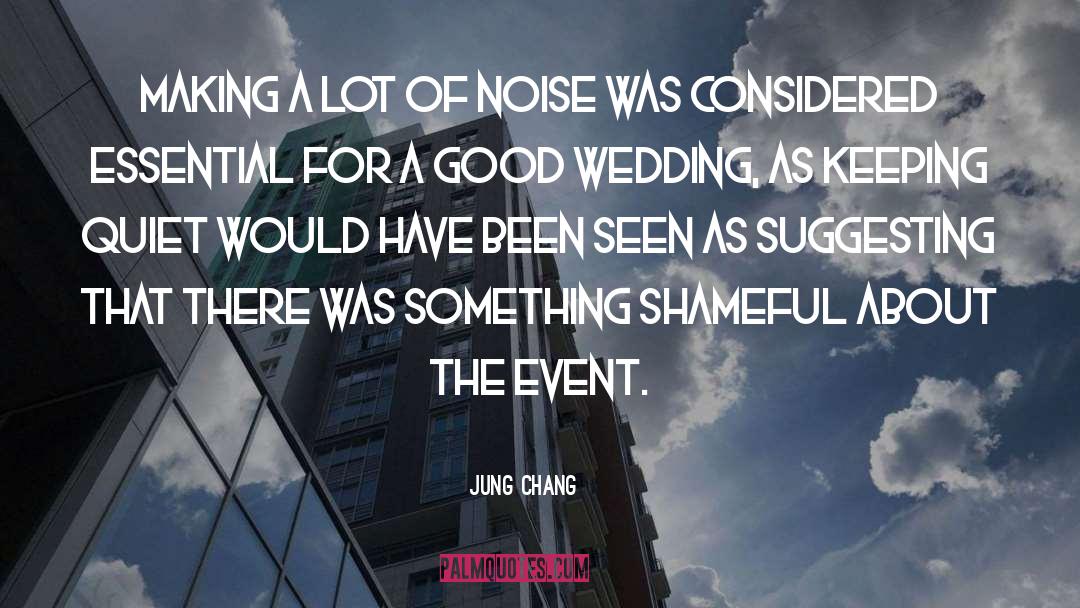Jung Chang Famous Quotes
Reading Jung Chang quotes, download and share images of famous quotes by Jung Chang. Righ click to see or save pictures of Jung Chang quotes that you can use as your wallpaper for free.
There were no state regulations about hairstyles or clothes. It was what everyone else was wearing that determined the rules of the day. And because the range was so narrow, people were always looking out for the tiniest variations. It was a real test of ingenuity to look different and attractive, and yet similar enough to everyone else so that nobody with an accusing finger could pinpoint what exactly was heretical.
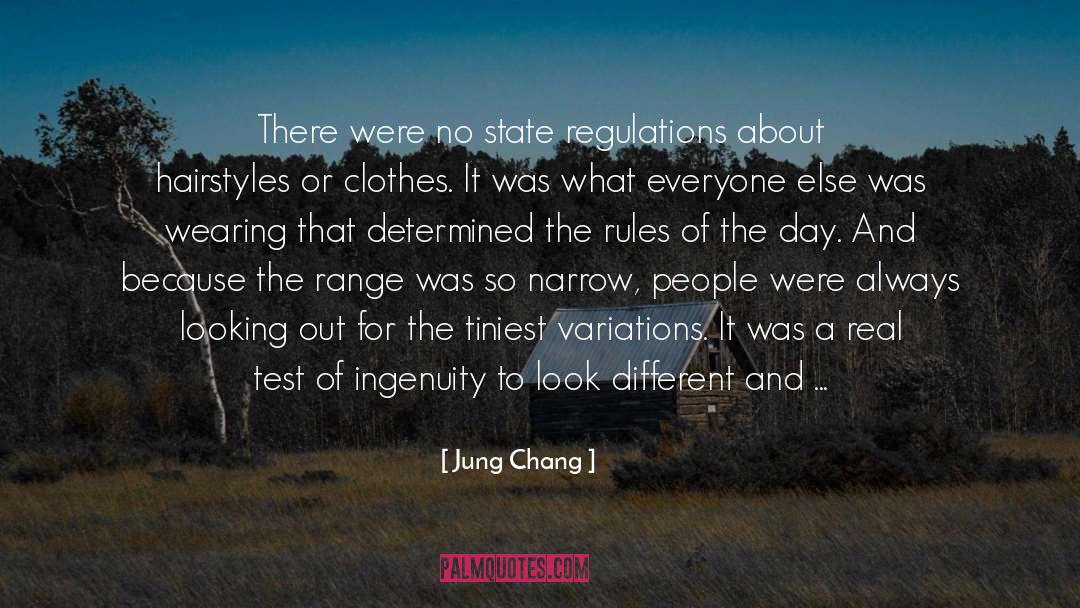
In 1969 my parents, my sister, my brother Jin-ming, and I were expelled from Chengdu one after another, and sent to distant parts of the Sichuan wilderness. We were among millions of urban dwellers to be exiled to the countryside.
In this way, young people would not be roaming the cities with nothing to do, creating trouble out of sheer boredom, and adults like my parents would have a 'future." They were part of the old administration which had been replaced by Mao's Revolutionary Committees, and packing them off to the sticks to do hard labor was a convenient solution.
According to Mao's rhetoric, we were sent to the countryside 'to be reformed." Mao advocated 'thought reform through labor' for everyone, but never explained the relationship between the two. Of course, no one asked for clarification. Merely to contemplate such a question was tantamount to treason. In reality, everyone in China knew that hard labor, particularly in the countryside, was always punishment. It was noticeable that none of Mao's henchmen, the members of the newly established Revolutionary Committees, army officers and very few of their children had to do it.
The first of us to be expelled was my father. Just after New Year 1969 he was sent to Miyi County in the region of Xichang, on the eastern edge of the Himalayas, an area so remote that it is China's satellite launch base today. It lies about 300 miles from Chengdu, four days' journey by truck, as there was no
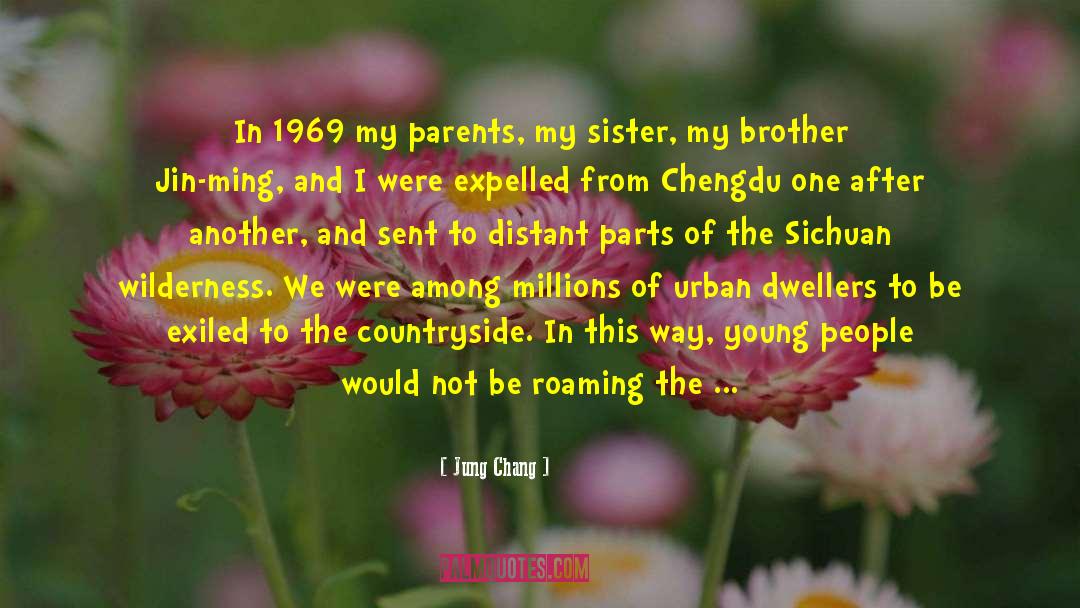
Our living quarters were in the same compound as the Eastern District administration. Government offices were mostly housed in large mansions which had been confiscated from Kuomintang officials and wealthy landlords. All government employees, even senior officials, lived at their office. They were not allowed to cook at home, and all ate in canteens. The canteen was also where everyone got their boiled water, which was fetched in thermos flasks.
Saturday was the only day married couples were allowed to spend together. Among officials, the euphemism for making love was 'spending a Saturday." Gradually, this regimented life-style relaxed a bit and married couples were able to spend more time together, but almost all still lived and spent most of their time in their office compounds.
My mother's department ran a very broad field of activities, including primary education, health, entertainment, and sounding out public opinion. At the age of twenty-two, my mother was in charge of all these activities for about a quarter of a million people. She was so busy we hardly ever saw her. The government wanted to establish a monopoly (known as 'unified purchasing and marketing') over trade in the basic commodities grain, cotton, edible o'fi, and meat. The idea was to get the peasants to sell these exclusively to the government, which would then ration them out to the urban population and to parts of the country where they were in short supply.

As the revolution was made by human beings, it was burdened with their failings.
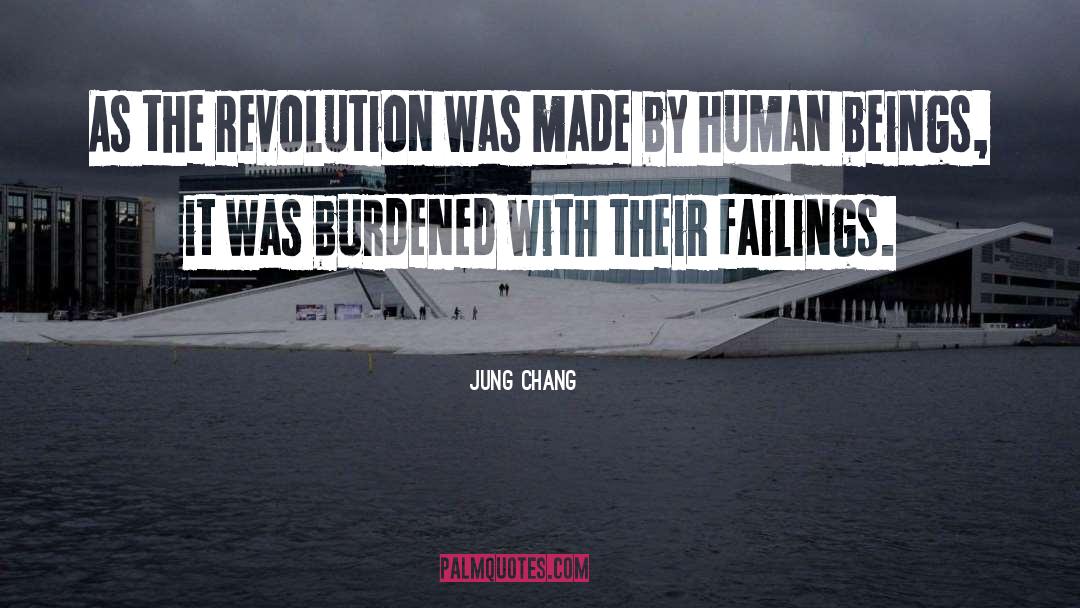
Traditional Chinese administration was a well-oiled machine, which, barring a crisis, would keep ticking over. Initiatives were not required and rarely offered. State policies depended almost entirely on the dynamism of the throne.

The Party's all-around intrusion into people's lives was the very point of the process known as 'thought reform." Mao wanted not only external discipline, but the total subjection of all thoughts, large or small. Every week a meeting for 'thought examination' was held for those 'in the revolution." Everyone had both to criticize themselves for incorrect thoughts and be subjected to the criticism of others.The meetings tended to be dominated by self-righteous and petty-minded people, who used them to vent their envy and frustration; people of peasant origin used them to attack those from 'bourgeois' backgrounds. The idea was that people should be reformed to be more like peasants, because the Communist revolution was in essence a peasant revolution. This process appealed to the guilt feelings of the educated; they had been living better than the peasants, and self-criticism tapped into this.Meetings were an important means of Communist control. They left people no free time, and eliminated the private sphere. The pettiness which dominated them was justified on the grounds that prying into personal details was a way of ensuring thorough soul-cleansing. In fact, pettiness was a fundamental characteristic of a revolution in which intrusiveness and ignorance were celebrated, and envy was incorporated into the system of control. My mother's cell grilled her week after week, month after month, forcing her to produce endless self-criticisms.She had to consent to this agonizing proces
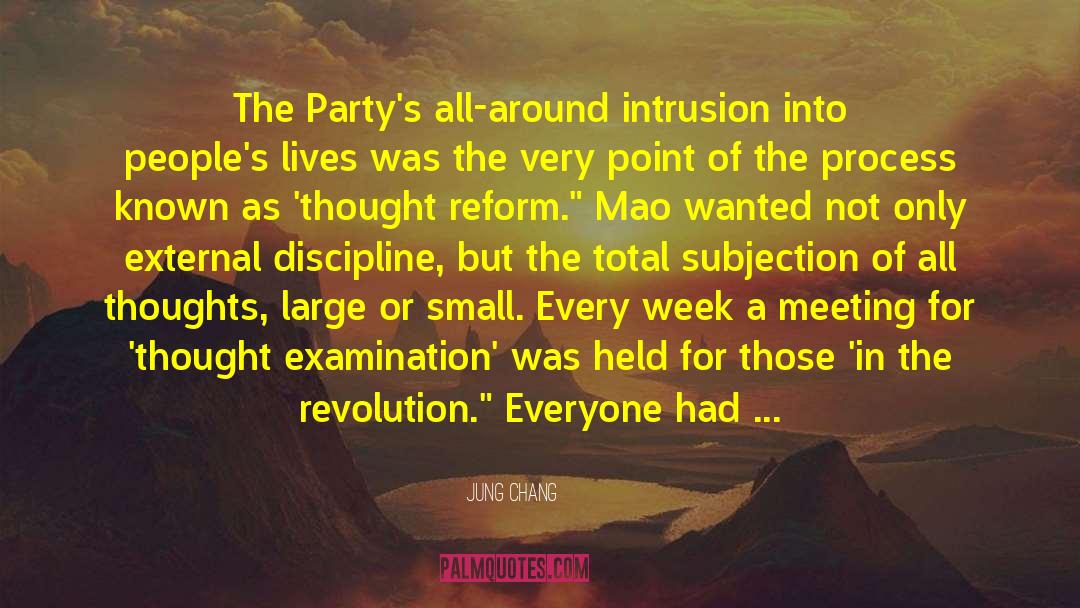
The news filled me with such euphoria that for an instant I was numb. My ingrained self-censorship immediately started working: I registered the fact that there was an orgy of weeping going on around me, and that I had to come up with some suitable performance. There seemed nowhere to hide my lack of correct emotion except the shoulder of the woman in front of me, one of the student officials, who was apparently heartbroken. I swiftly buried my head in her shoulder and heaved appropriately. As so often in China, a bit of ritual did the trick. Sniveling heartily she made a movement as though she was going to turn around and embrace me I pressed my whole weight on her from behind to keep her in her place, hoping to give the impression that I was in a state of abandoned grief.
In the days after Mao's death, I did a lot of thinking. I knew he was considered a philosopher, and I tried to think what his 'philosophy' really was. It seemed to me that its central principle was the need or the desire? for perpetual conflict. The core of his thinking seemed to be that human struggles were the motivating force of history and that in order to make history 'class enemies' had to be continuously created en masse. I wondered whether there were any other philosophers whose theories had led to the suffering and death of so many. I thought of the terror and misery to which the Chinese population had been subjected. For what?
But Mao's theory might just be the extension o
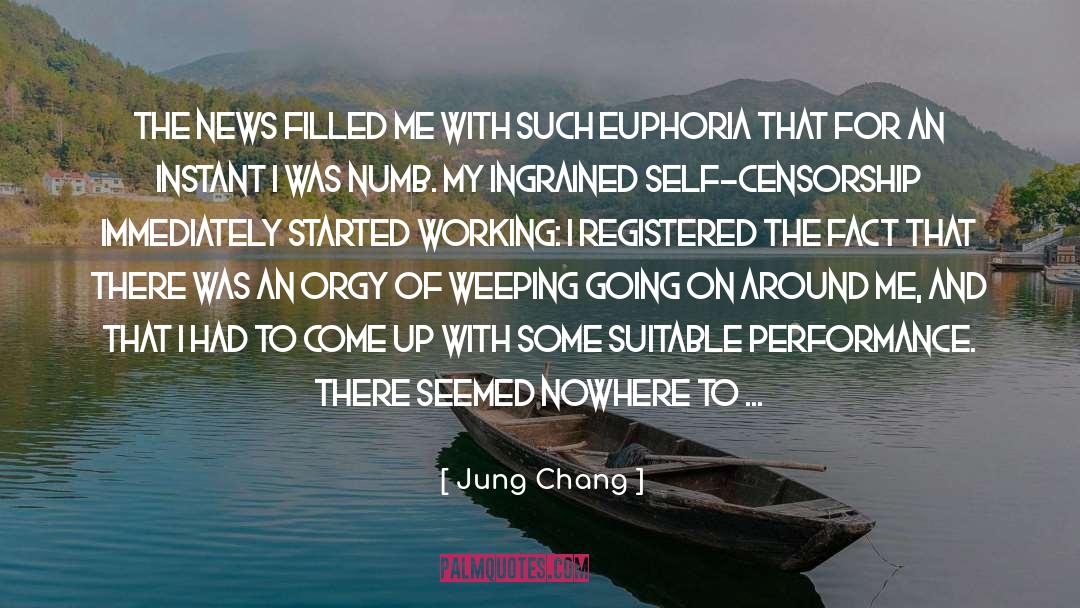
I could understand ignorance, but I could not accept its glorification, still less its right to rule.
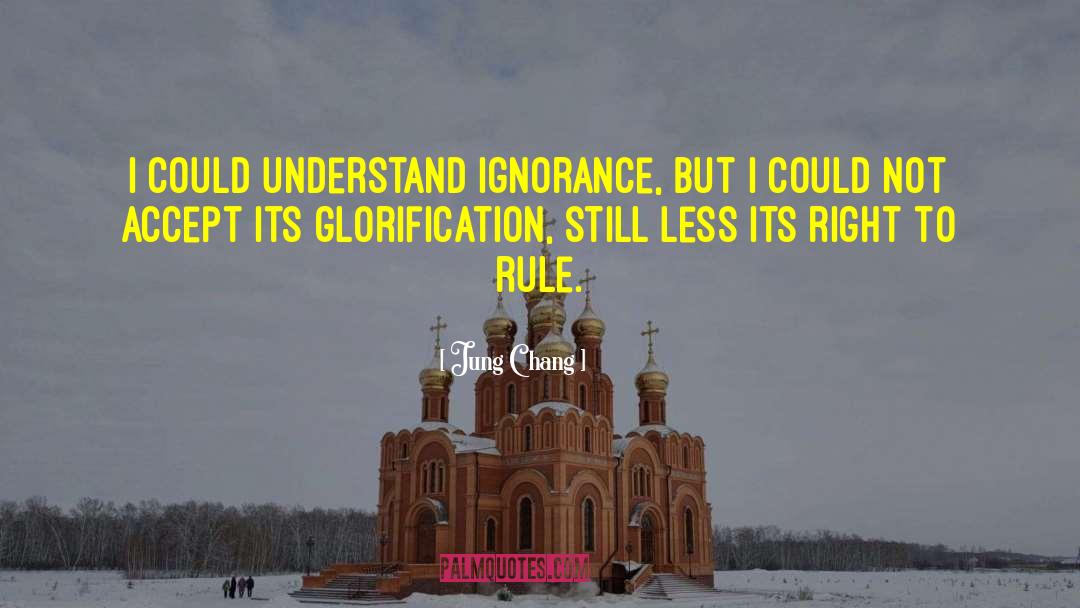
My mother could see that as far as my father's relationship with the Party was concerned, she was an outsider. One day, when she ventured some critical comments about the situation and got no response from him, she said bitterly, "You are a good Communist, but a rotten husband!" My father nodded. He said he knew.
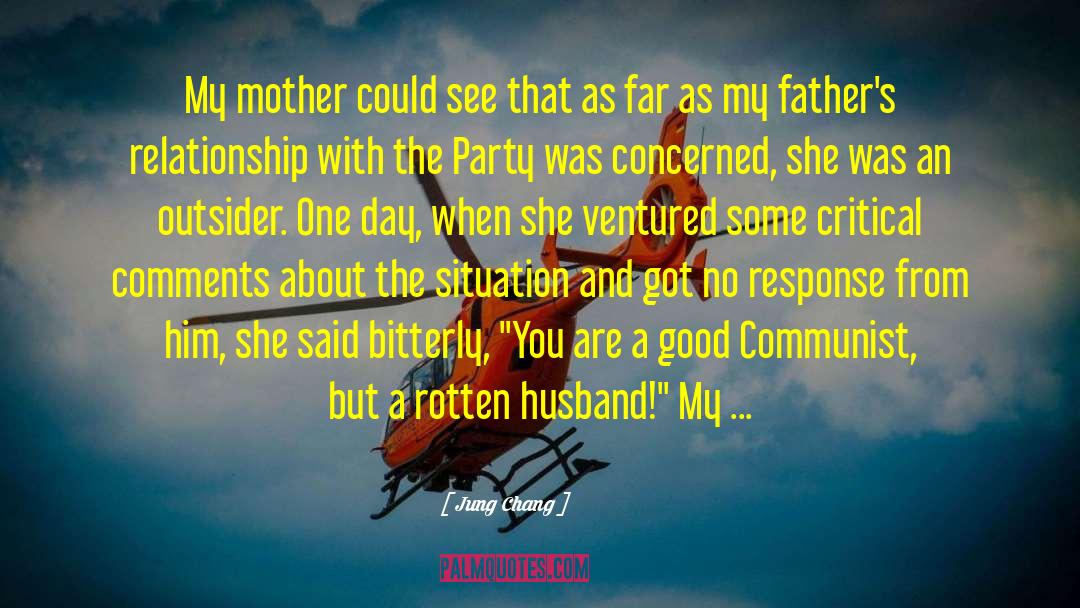
Inner courtyard. Dr. Xia tolerated Yu-wu's rowdy parties without demur, even though his sect, the Society of Reason, forbade gambling and drinking. My mother was puzzled, but put it down to her stepfather's tolerant nature. It was only years later when she thought back that she felt certain that Dr. Xia had known, or guessed, Yu-wu's real identity. When my mother heard that her cousin Hu had been killed by the Kuomintang she approached Yu-wu about working for the Communists. He turned
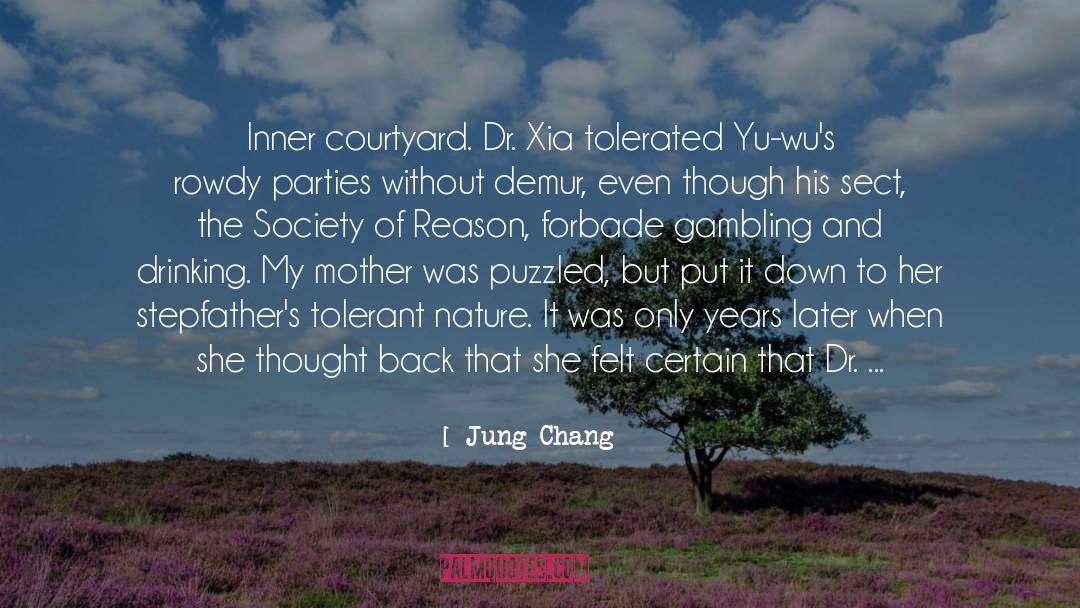
Over the years of the Cultural Revolution, I was to witness people being attacked for saying "thank you" too often, which was branded as "bourgeois hypocrisy"; courtesy was on the brink of extinction.
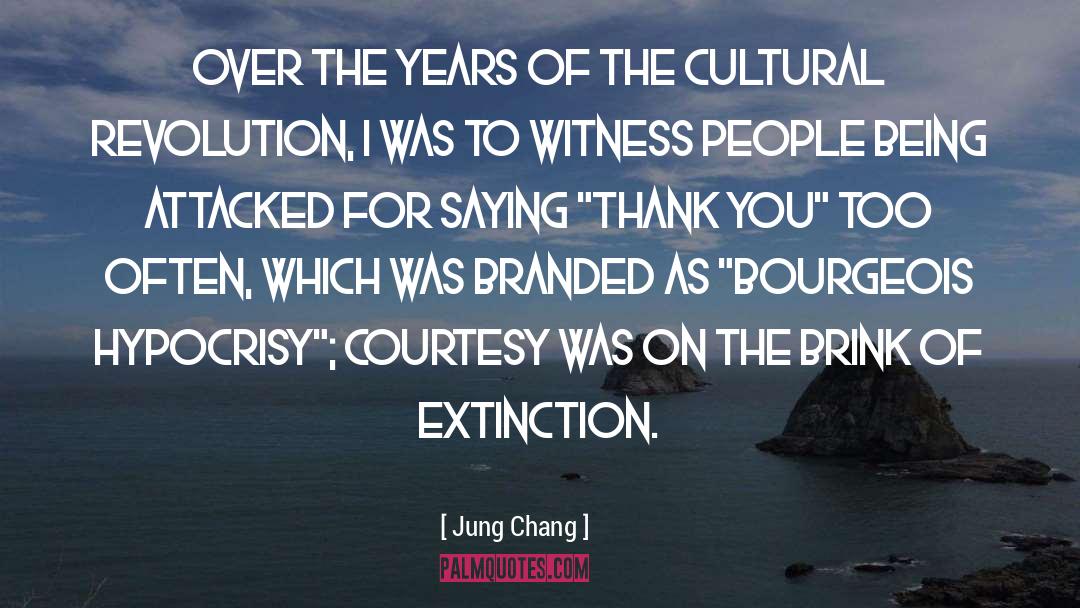
Before our "company" set off, at a wink from the officer, Plumpie stood up and proposed a search. I could see that some of the others thought she was wasting our time, but our company commander cheerfully seconded her proposal. He suggested we search him first. A boy was called to do this, and found a big bunch of keys on him. Our commander acted as though he had been genuinely careless, and gave Plumpie a victorious smile. The rest of us searched each other. This roundabout way of doing things reflected a Maoist practice: things had to look as though they were the wish of the people, rather than commands from above. Hypocrisy and playacting were taken for granted.
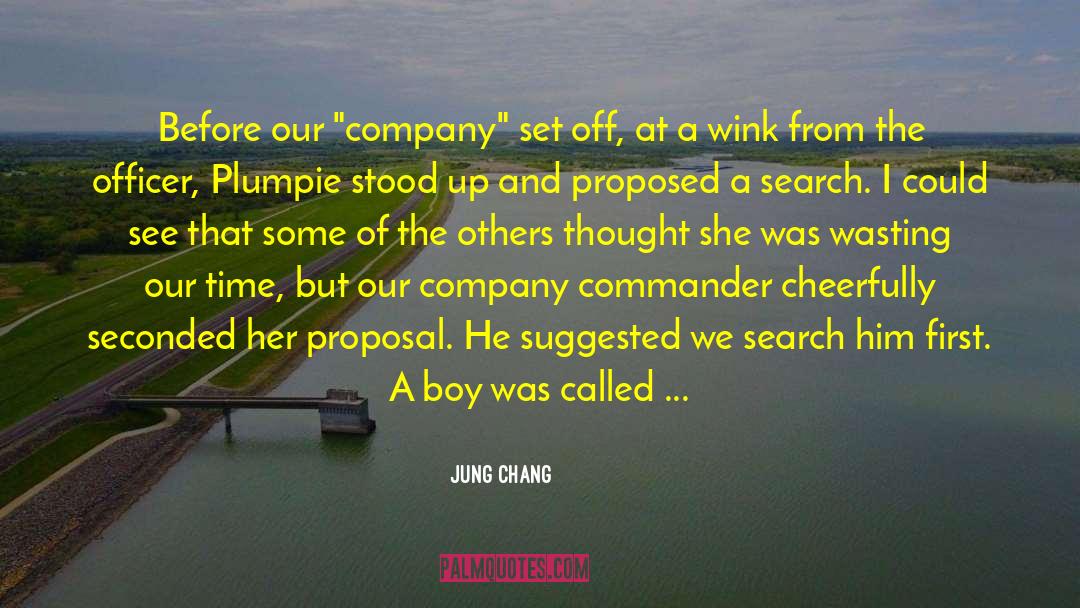
The Japanese are a disease of the skin ... the Communists are a disease of the heart. Everything personal was political ... Two reds sandwiching a black ...
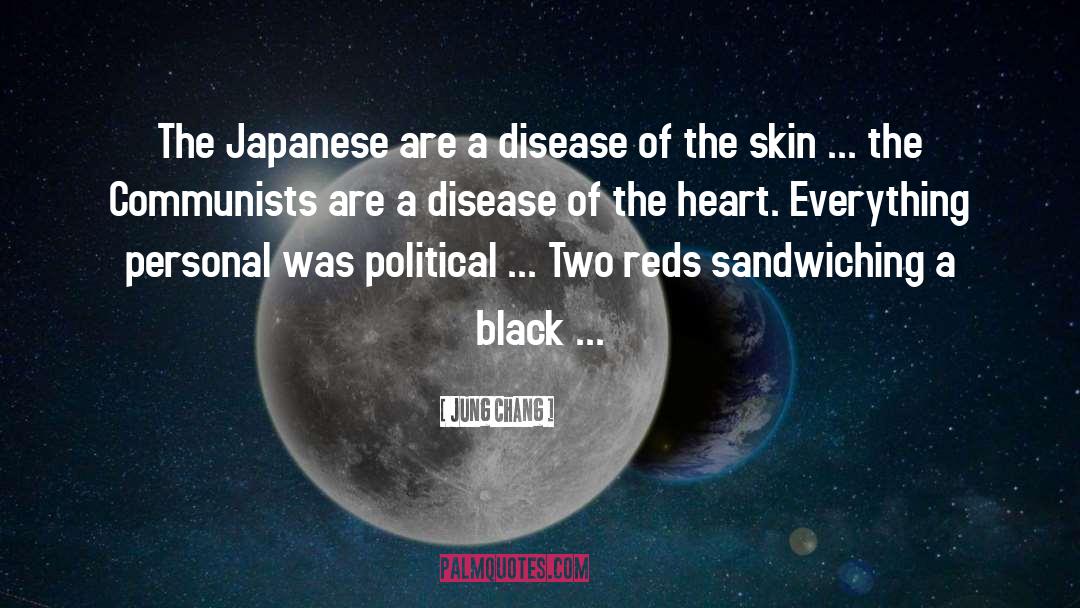
Every time she went home she found herself being criticized. She was accused of being "too attached to her family," which was condemned as a "bourgeois habit," and had to see less and less of her own mother.
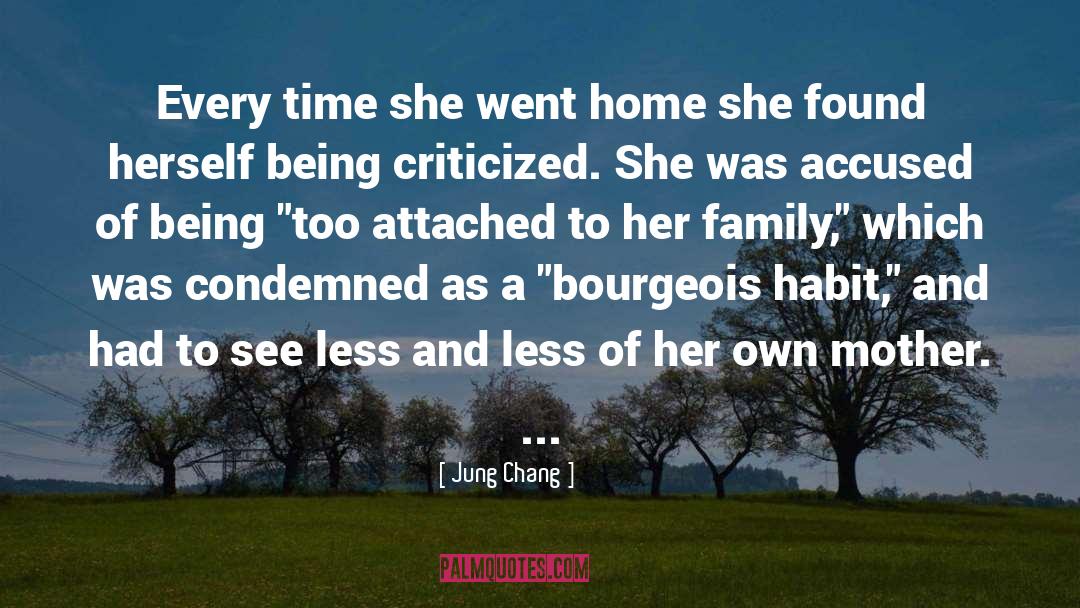
Startled, he tried to comfort him. But Father said slowly, "I ask myself whether I am afraid of death. I don't think I am. My life as it is now is worse. And it looks as if there is not going to be any ending. Sometimes I feel weak: I stand by Tranquillity River and think, Just one leap and I can get it over with. Then I tell myself I must not. If I die without being cleared, there will be no end of trouble for all of you… I have been thinking a lot lately. I had a hard childhood, and society was full of injustice. It was for a fair society that I joined the Communists. I've tried my best through the years. But what good has it done for the people? As for myself, why is it that in the end I have come to be the ruin of my family? People who believe in retribution say that to end badly you must have something on your conscience. I have been thinking hard about the things I've done in my life. I have given orders to execute some people…"
Father went on to tell Jin-ming about the death sentences he had signed, the names and stories of the e-ba ('ferocious despots') in the land reform in Chaoyang, and the bandit chiefs in Yibin.
"But these people had done so much evil that God himself would have had them killed.
What, then, have I done wrong to deserve all this?"
After a long pause, Father said, "If I die like this, don't believe in the Communist Party anymore.
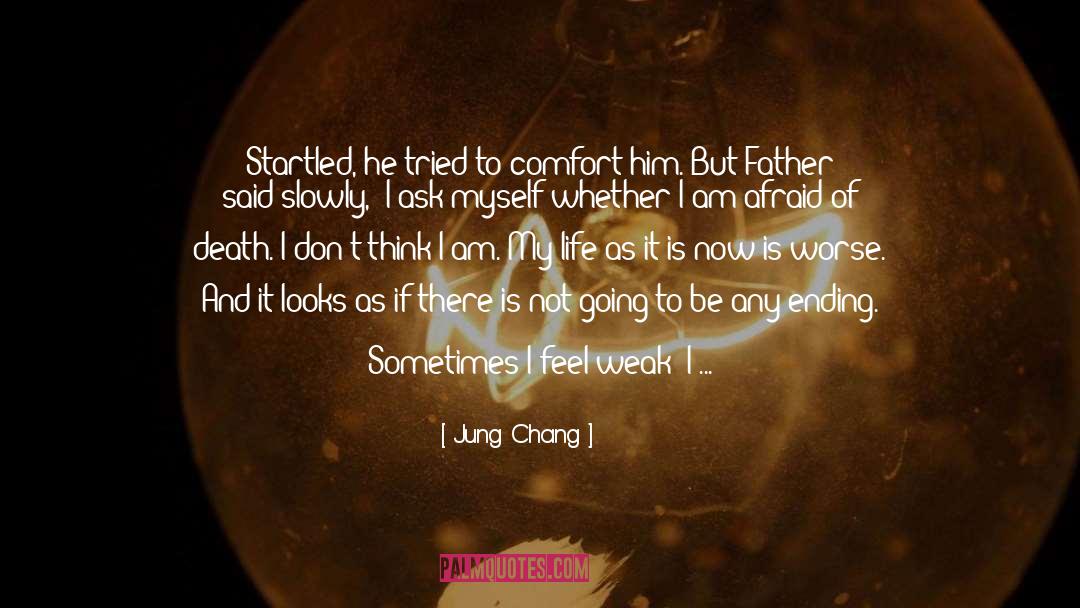
When I heard about the ease with which the Four had been removed, I felt a wave of sadness. How could such a small group of second-rate tyrants ravage 900 million people for so long? But my main feeling was joy. The last tyrants of the Cultural Revolution were finally gone. My rapture was widely shared. Like many of my countrymen, I went out to buy the best liquors for a celebration with my family and friends, only to find the shops out of stock there was so much spontaneous rejoicing.
There were official celebrations as well exactly the same kinds of rallies as during the Cultural Revolution, which infuriated me. I was particularly angered by the fact that in my department, the political supervisors and the student officials were now arranging the whole show, with unperturbed self-righteousness.
The new leadership was headed by Mao's chosen successor, Hua Guofeng, whose only qualification, I believed, was his mediocrity. One of his first acts was to announce the construction of a huge mausoleum for Mao on Tiananmen Square. I was outraged: hundreds of thousands of people were still homeless after the earthquake in Tangshan, living in temporary shacks on the pavements.
With her experience, my mother had immediately seen that a new era was beginning. On the day after Mao's death she had reported for work at her depas'uuent. She had been at home for five years, and now she wanted to put her energy to use again. She was given a job as the numbe
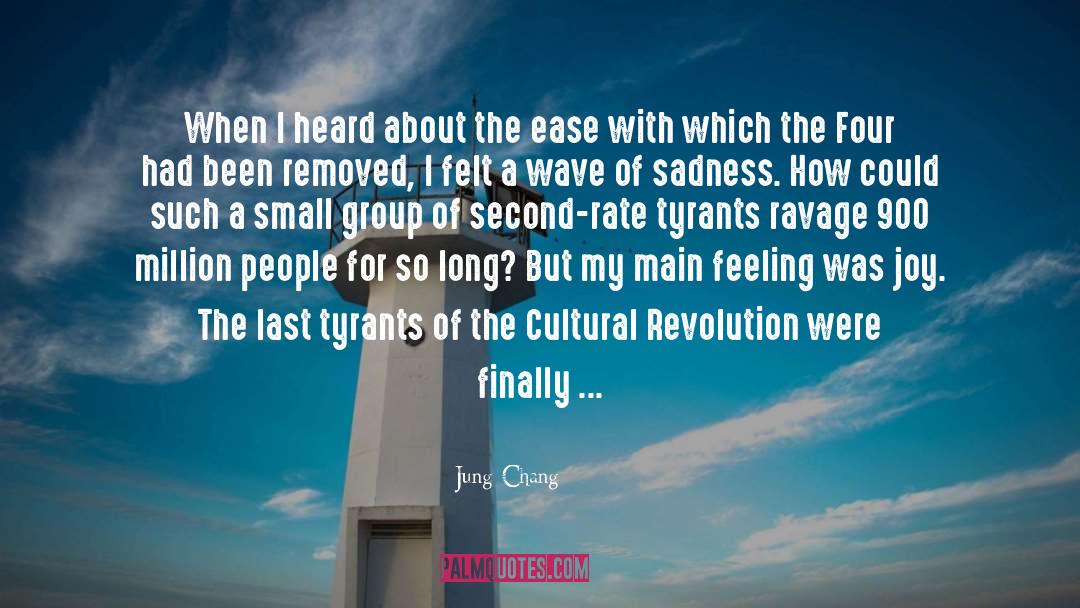
So the story of Wild Fox Kang's attempted coup and murder of Cixi lay in darkness and obscurity for nearly a century, until the 1980s, when Chinese scholars discovered in Japanese archives the testimony of the designated killer, Bi, which established beyond doubt the existence of the plot.
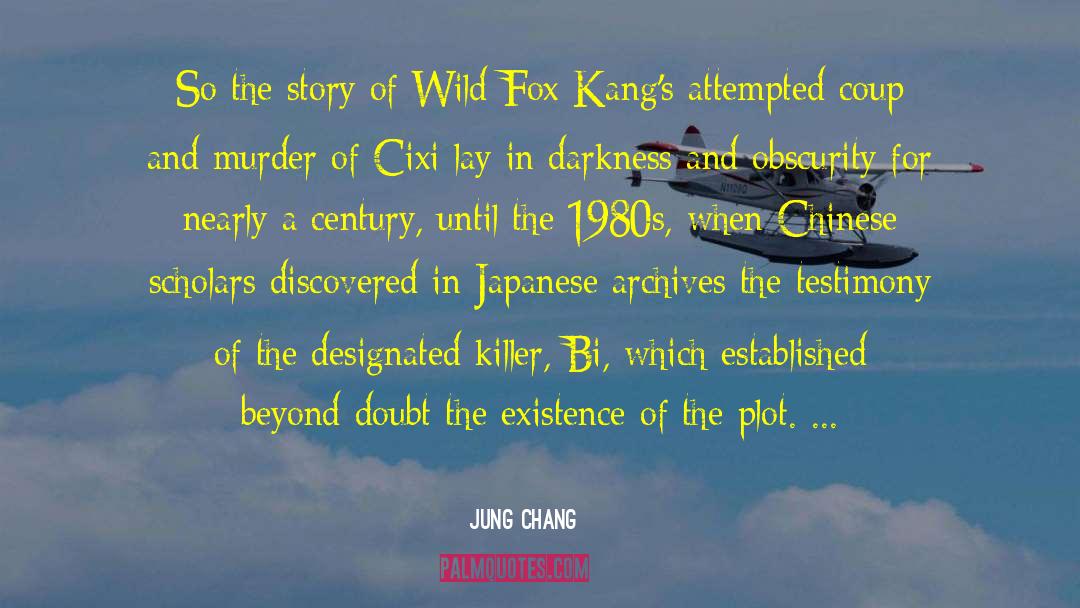
When boys played "guerrilla warfare," which was their version of cowboys and Indians, the enemy side would have thorns glued onto their noses and say "hello" all the time.

Our textbooks were ridiculous propaganda. The first English sentence we learned was "Long live Chairman Mao!" But no one dared to explain the sentence grammatically. In Chinese the term for the optative mood, expressing a wish or desire, means 'something unreal." In 1966 a lecturer at Sichuan University had been beaten up for 'having the audacity to suggest that "Long live Chairman Mao!" was unreal!" One chapter was about a model youth hero who had drowned after jumping into a flood to save an electricity pole because the pole would be used to carry the word of Mao.
With great difficulty, I managed to borrow some English language textbooks published before the Cultural Revolution from lecturers in my department and from Jin-ming, who sent me books from his university by post. These contained extracts from writers like Jane Austen, Charles Dickens, and Oscar Wilde, and stories from European and American history. They were a joy to read, but much of my energy went toward finding them and then trying to keep them.
Whenever someone approached, I would quickly cover the books with a newspaper. This was only partly because of their 'bourgeois' content. It was also important not to appear to be studying too conscientiously, and not to arouse my fellow students' jealousy by reading something far beyond them. Although we were studying English, and were paid par fly for our propaganda value by the government to do this, we must not be seen to be too devoted to o
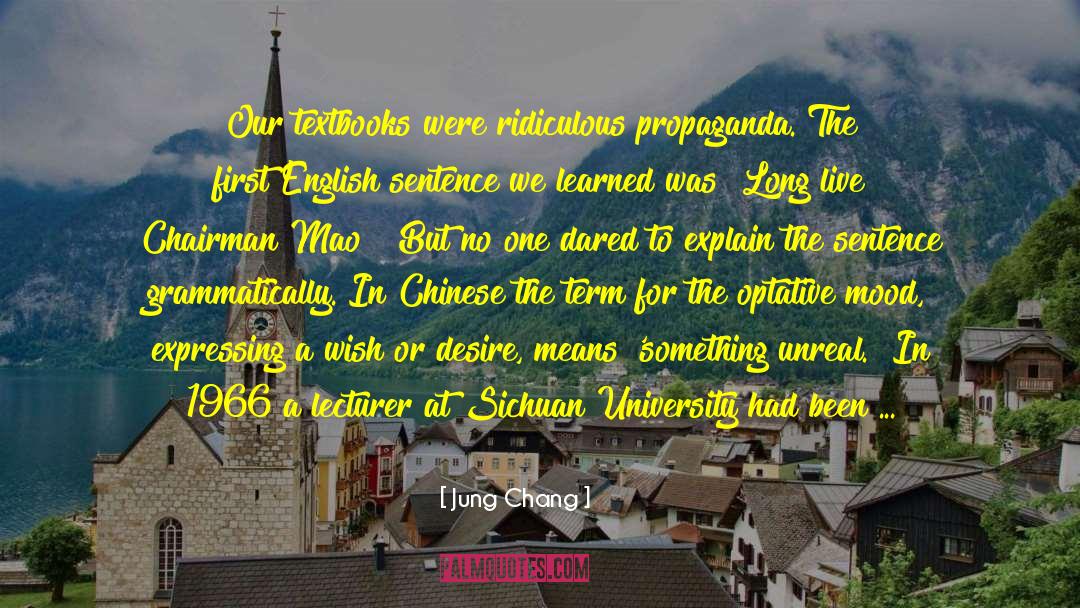
Although my book is banned I am still allowed to go to China and travel. There is no longer the kind of control that Mao used to have-there have been deep fundamental changes in society.
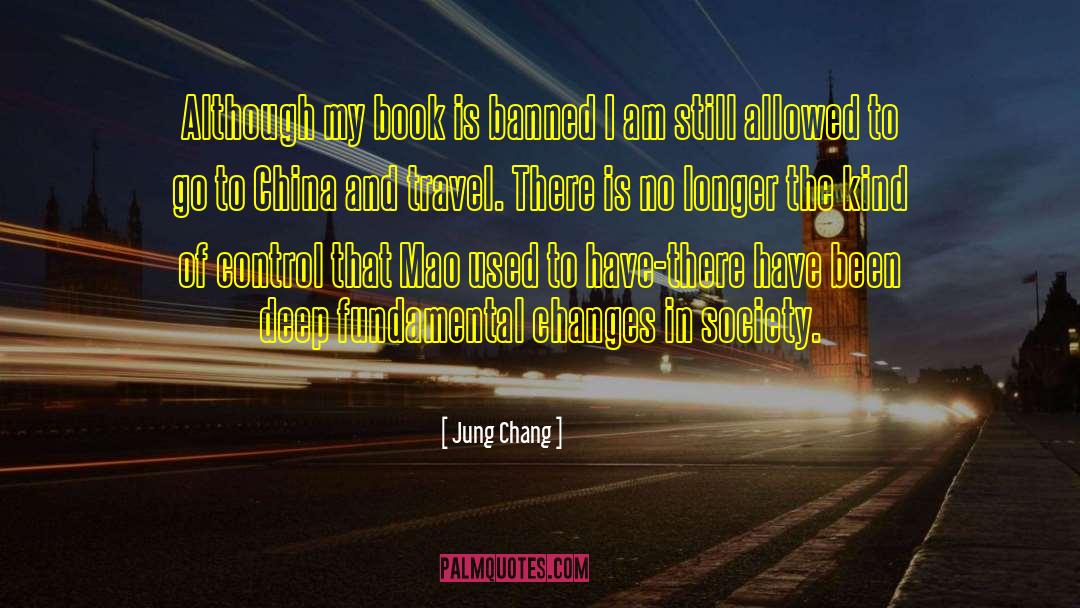
Inflation had risen to the unimaginable figure of just over 100,000 percent by the end of 1947
and it was to go to 2,870,000 percent by the end of 1948 ...
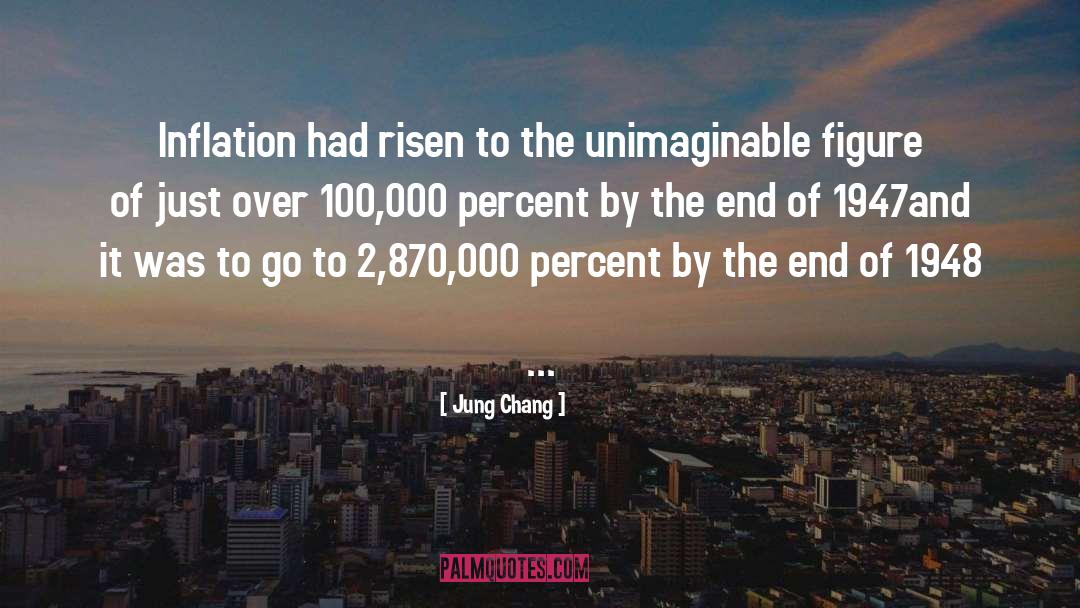
She was a pious Buddhist and every day in her prayers asked Buddha not ro reincarnate her as a woman. "Let me become a cat or dog, but not a woman," was her constant murmur as she shuffled around the house, oozing apology with every step.
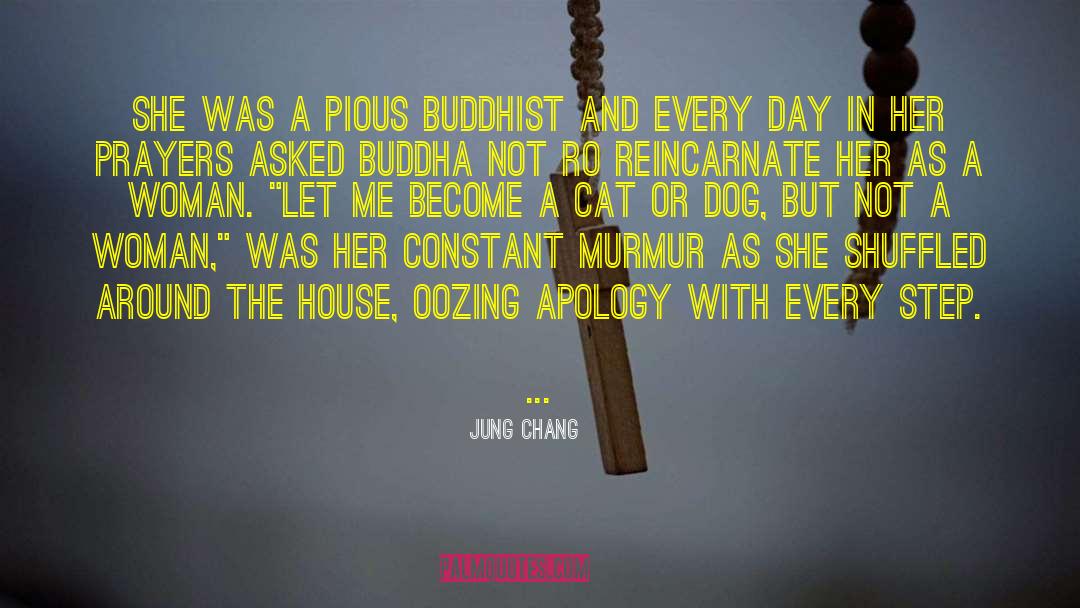
One piece of information that made an impression on her was that individual Chinese lives mattered to the Westerners.
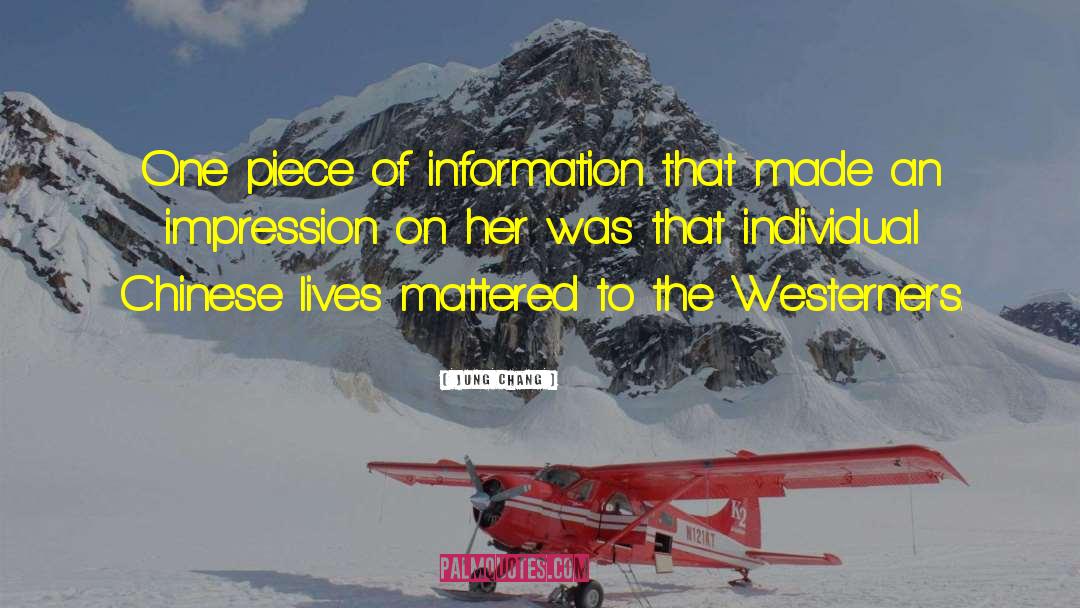
They verbally attacked each other with Mao's quotations, making cynical use of his guru-like elusiveness––it was easy to select a quotation of Mao's to suit any situation, or even both sides of the same argument.
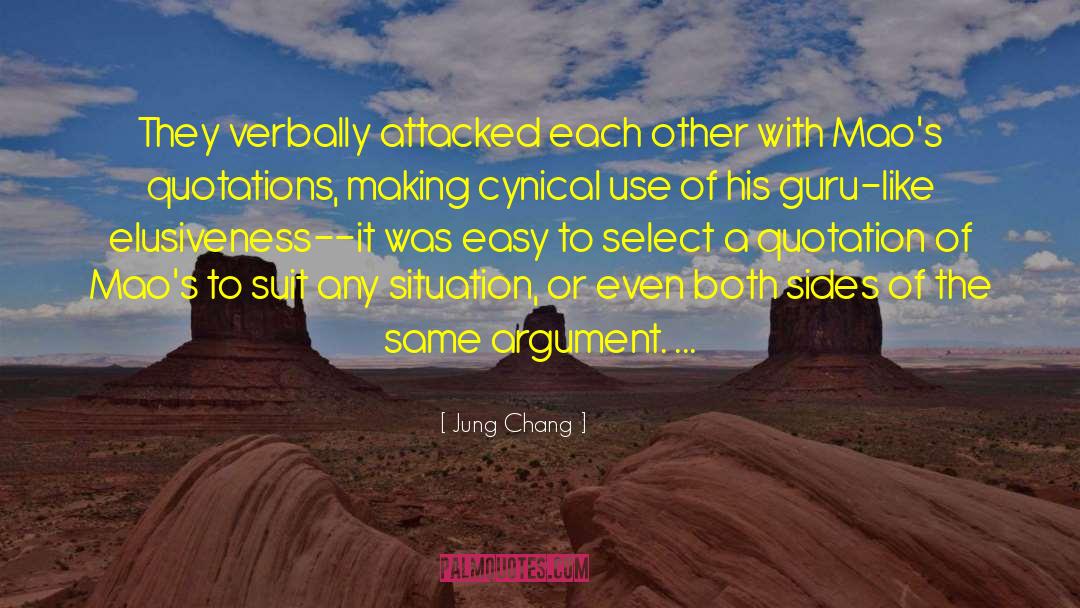
If children were brought up to become non-conformists it would only ruin their lives. So parents all over China who loved their children told them to do as Chairman Mao said. It was not possible to tell them anything else.
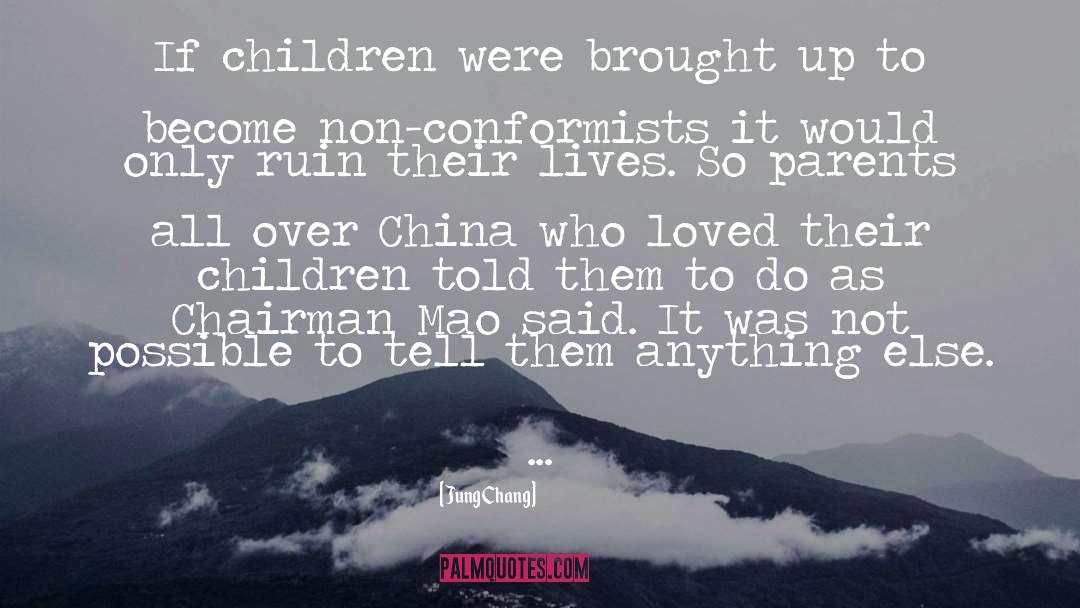
Cixi's lack of formal education was more than made up for by her intuitive intelligence, which she liked to use from her earliest years. In 1843, when she was seven, the empire had just finished its first war with the West, the Opium War, which had been started by Britain in reaction to Beijing clamping down on the illegal opium trade conducted by British merchants. China was defeated and had to pay a hefty indemnity.
Desperate for funds, Emperor Daoguang (father of Cixi's future husband) held back the traditional presents for his sons' brides – gold necklaces with corals and pearls – and vetoed elaborate banquets for their weddings. New Year and birthday celebrations were scaled down, even cancelled, and minor royal concubines had to subsidise their reduced allowances by selling their embroidery on the market through eunuchs. The emperor himself even went on surprise raids of his concubines' wardrobes, to check whether they were hiding extravagant clothes against his orders. As part of a determined drive to stamp out theft by officials, an investigation was conducted of the state coffer, which revealed that more "than nine million taels of silver had gone missing.
Furious, the emperor ordered all the senior keepers and inspectors of the silver reserve for the previous forty-four years to pay fines to make up the loss – whether or not they were guilty.
Cixi's great-grandfather had served as one of the keepers and his share of the fine amoun
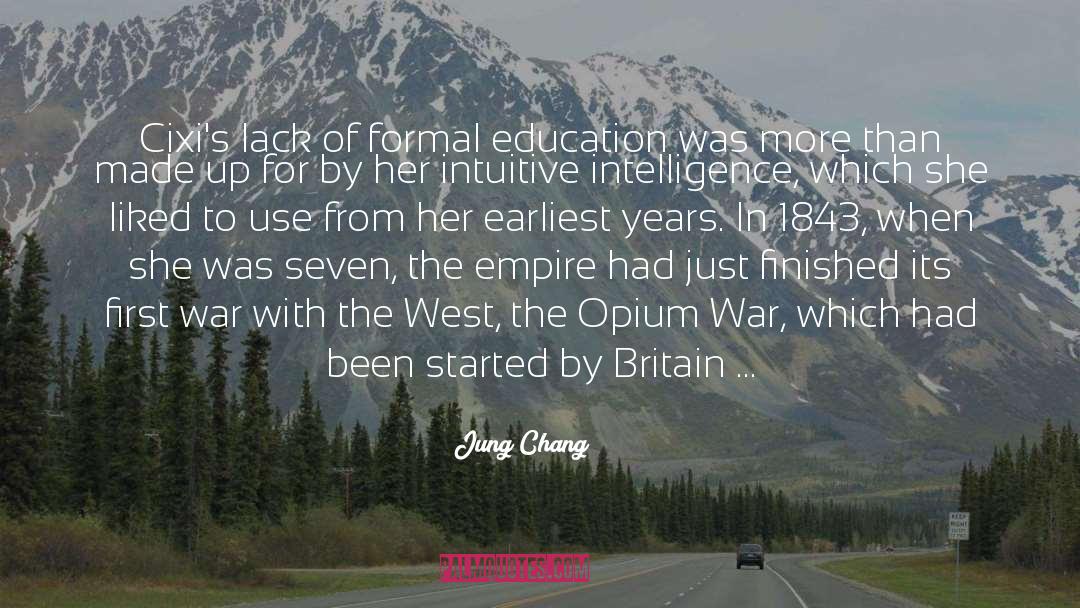
The Manchus drank tea with a lot of milk. In her case, the milk came from the breasts of a nurse. Cixi had been taking human milk since her prolonged illness in the early 1880s, on the recommendation of a renowned doctor. Several wet nurses were employed, and took turns to squeeze milk into a bowl for her. The nurses brought their sucking babies with them, and the woman who served her the longest stayed on in the palace, her son being given education and an office job.
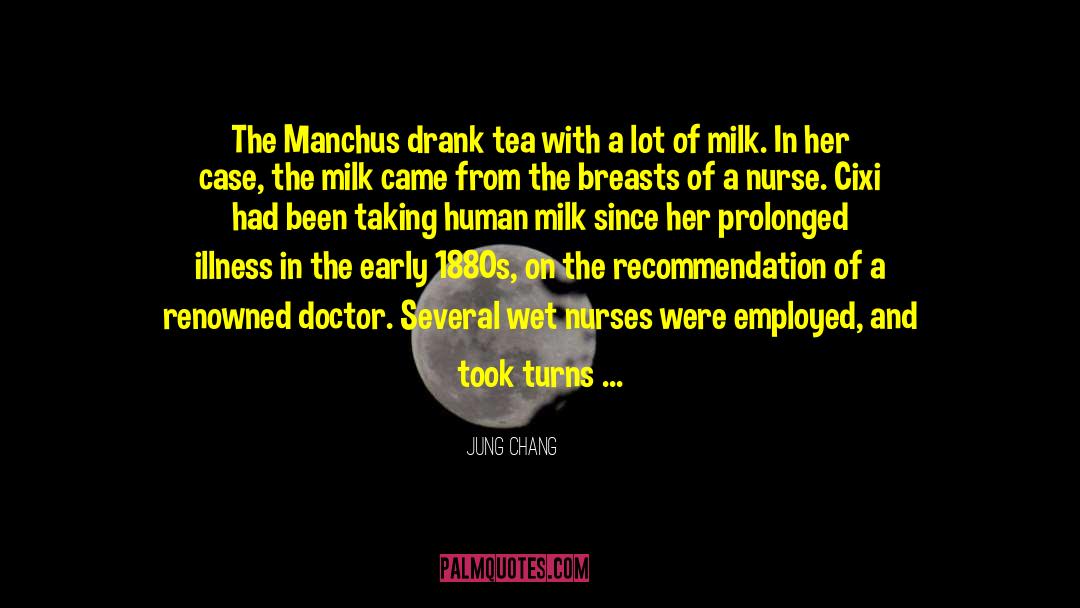
Most peasants did not miss the school.
"What's the point?" they would say.
"You pay fees and read for years, and in the end you are still a peasant, earning your food with your sweat. You don't get a grain of rice more for being able to read books. Why waste time and money?
Might as well start earning your work points right away."
The virtual absence of any chance of a better future and the near total immobility for anyone born a peasant took the incentive out of the pursuit of knowledge. Children of school age would stay at home to help their families with their work or look after younger brothers and sisters. They would be out in the fields when they were barely in their teens. As for girls, the peasants considered it a complete waste of time for them to go to school.
"They get married and belong to other people. It's like pouring water on the ground."
The Cultural Revolution was trumpeted as having brought education to the peasants through 'evening classes." One day my production team announced it was starting evening classes and asked Nana and me to be the teachers. I was delighted. However, as soon as the first 'class' began, I realized that this was no education.
The classes invariably started with Nana and me being asked by the production team leader to read out articles by Mao or other items from the People's Daily. Then he would make an hour-long speech consisting of all the latest po
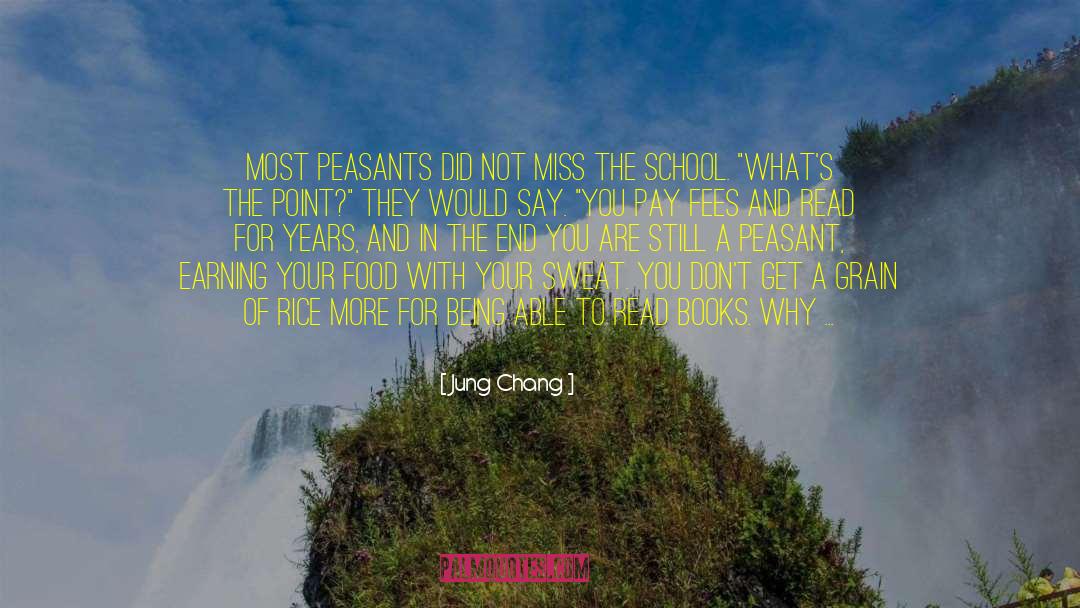
Poverty drove their parents to have them castrated as young children, hoping they would earn a better living at court. Usually the father would take the boy to a specialist castrator, who operated by the appointment of the court. After a contract was signed, absolving the castrator from any responsibility in case of death or failure (both highly likely outcomes), the unimaginably painful operation was performed. The castrator's fee was huge and had to be paid from future earnings.
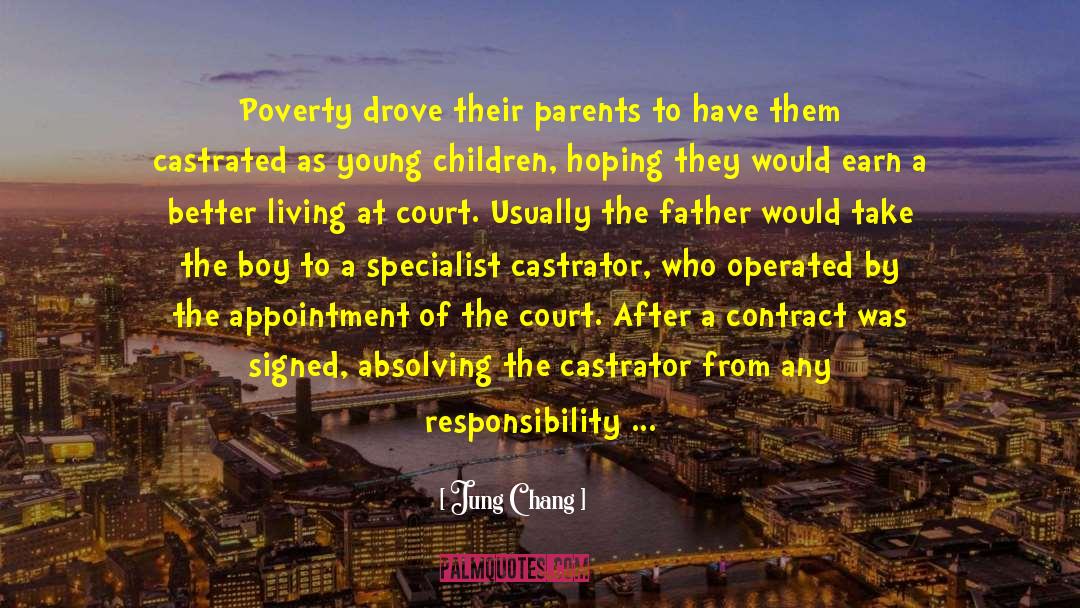
For each self-criticism, there were many criticisms. My mother's two comrades insisted that she had behaved in a 'bourgeois' manner. They said she had not wanted to go to the country to help collect food; when she pointed out that she had gone, in line with the Party's wishes, they retorted: "Ah, but you didn't really want to go." Then they accused her of having enjoyed privileged food cooked, moreover, by her mother at home and of succumbing to illness more than most pregnant women. Mrs. Mi also criticized her because her mother had made clothes for the baby.
"Who ever heard of a baby wearing new clothes?"she said.
"Such a bourgeois waste! Why can't she just wrap the baby up in old clothes like everyone else?" The fact that my mother had shown her sadness that my grandmother had to leave was singled out as definitive proof that she 'put family first," a serious offense.
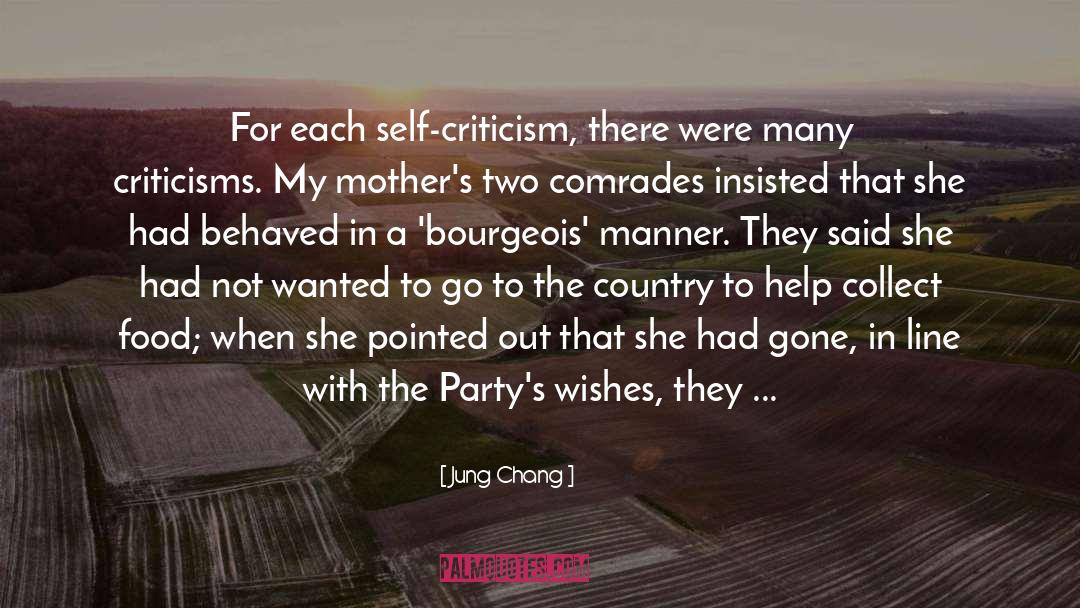
My father said he was going to write to the Jinzhou City Party Committee asking for permission to 'talk about love' ... My mother supposed it was a bit like asking permission from the head of the family ... the Communist Party was the new patriarch.
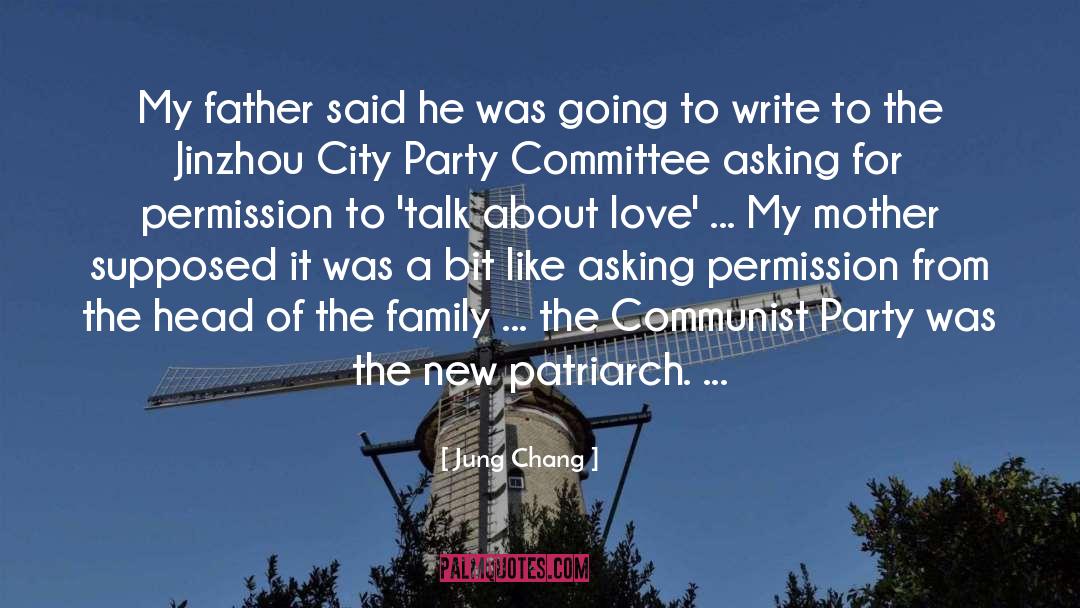
Meetings were an important means of Communist control. They left people no free time, and eliminated the private sphere. The pettiness which dominated them was justified on the grounds that prying into personal details was a way of ensuring thorough soul-cleansing. In fact, pettiness was a fundamental characteristic of a revolution in which intrusiveness and ignorance were celebrated, and envy was incorporated into the system of control.
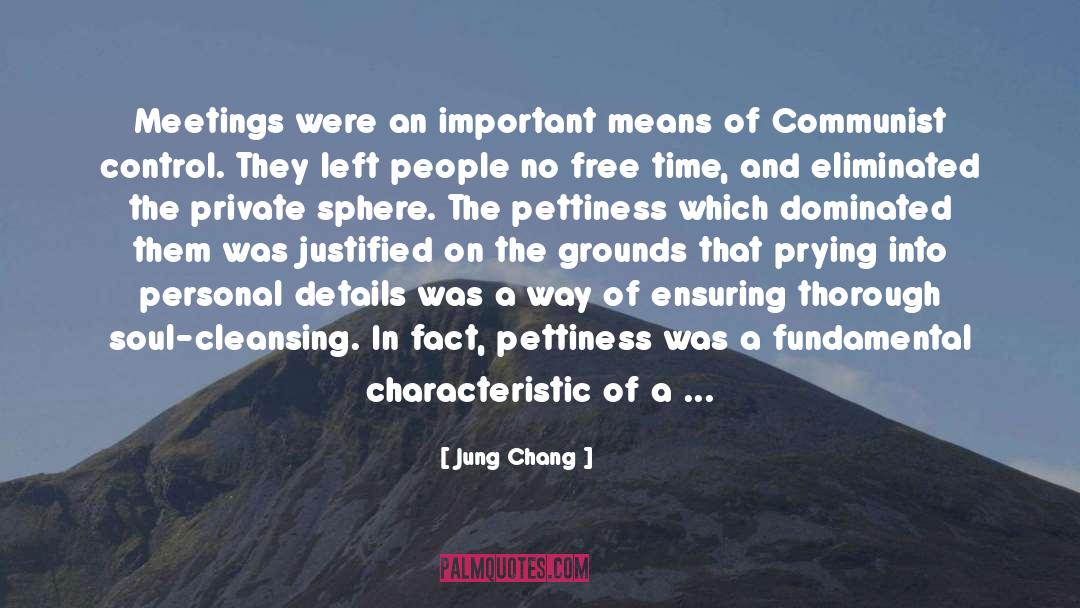
I no longer have the terrible nightmares that I used to have. Mao had just died in 1976, and China began to open up. For the first time scholarships to go to the West to study were awarded on academic merit.
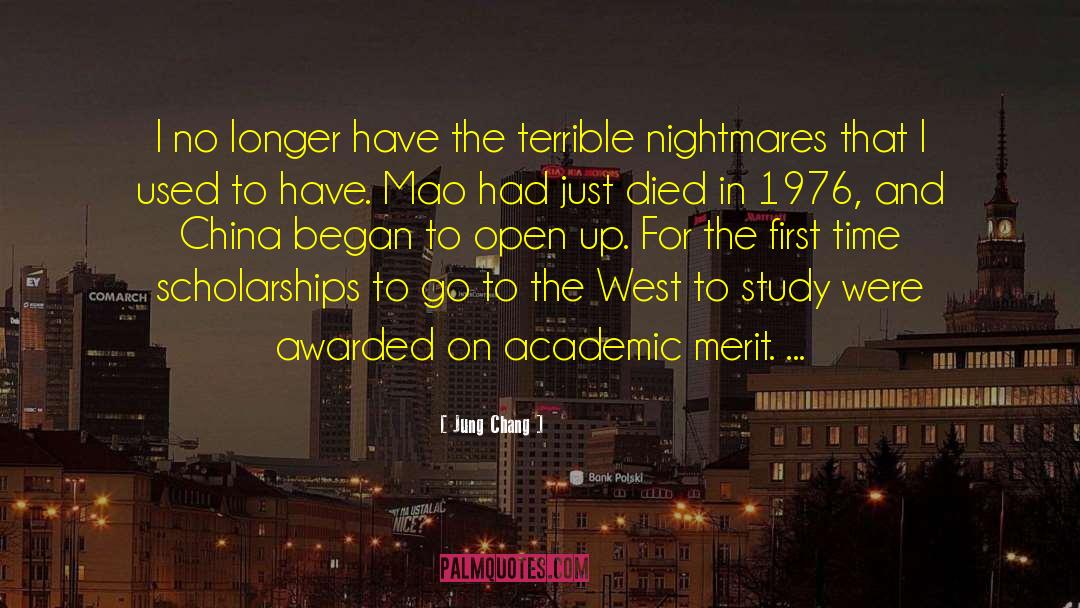
My joy at the sensation of my mind opening up and expanding was beyond description.

The cult of Mao and the cult of Lei Feng were two faces of the same coin: one was the cult of personality; the other, its essential corollary, was the cult of impersonality
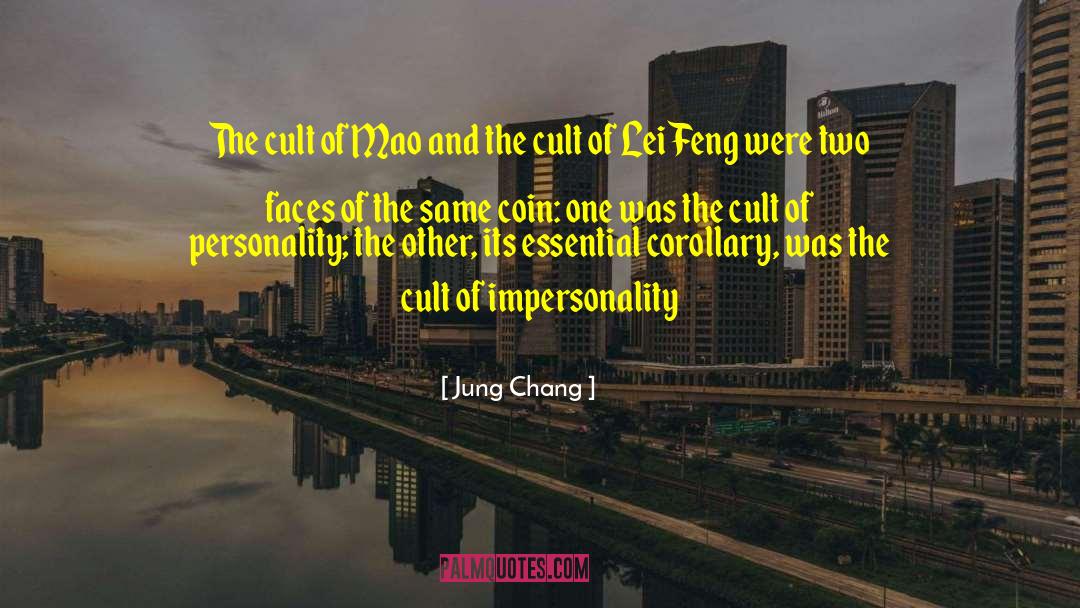
The most direct path to Party was raising pigs. The company had several dozen of these and they occupied an unequaled place in the hearts of the soldiers; officers and men alike would hang around the pigsty, observing, commenting, and willing the animals to grow. If the pigs were doing well, the swine herds were the darlings of the company, and there were many contestants for this profession.
Xiao-her became a full-time swineherd. It was hard, filthy work, not to mention the psychological pressure.
Every night he and his colleagues took turns to get up in the small hours to give the pigs an extra feed. When a sow produced piglets they kept watch night after night in case she crushed them. Precious soybeans were carefully picked, washed, ground, strained, made into 'soybean milk," and lovingly fed to the mother to stimulate her milk.
Life in the air force was very unlike what Xiao-her had imagined. Producing food took up more than a third of the entire time he was in the military. At the end of a year's arduous pig raising, Xiao-her was accepted into the Party.
Like many others, he put his feet up and began to take it easy.
After membership in the Party, everyone's ambition was to become an officer; whatever advantage the former brought, the latter doubled it. Getting to be an officer depended on being picked by one's superiors, so the key was never to displease them. One day Xiao-her was summoned to see one of the co
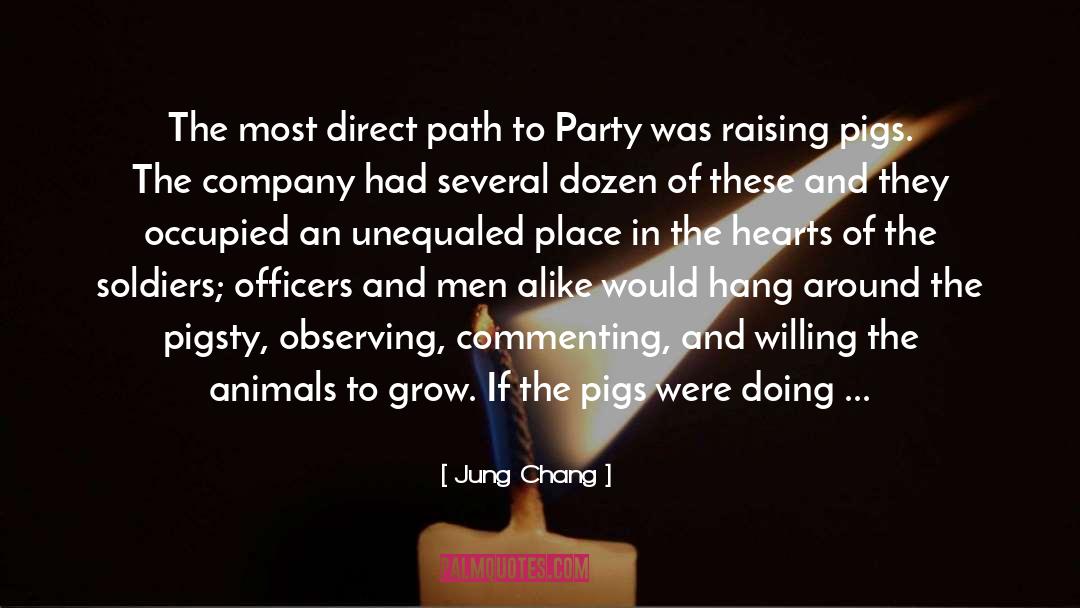
On our way down, we passed a two-story villa, hidden in a thicket of Chinese parasol trees, magnolia, and pines. It looked almost like a random pile of stones against the background of the rocks. It struck me as an unusually lovely place, and I snapped my last shot. Suddenly a man materialized out of nowhere and asked me in a low but commanding voice to hand over my camera. He wore civilian clothes, but I noticed he had a pistol. He opened the camera and exposed my entire roll of film. Then he disappeared, as if into the earth. Some tourists standing next to me whispered that this was one of Mao's summer villas. I felt another pang of revulsion toward Mao, not so much for his privilege, but for the hypocrisy of allowing himself luxury while telling his people that even comfort was bad for them. After we were safely out of earshot of the invisible guard, and I was bemoaning the loss of my thirty-six pictures, Jin-ming gave me a grin: "See where goggling at holy places gets you!"
We left Lushan by bus. Like every bus in China, it was packed, and we had to crane our necks desperately trying to breathe. Virtually no new buses had been built since the beginning of the Cultural Revolution, during which time the urban population had increased by several tens of millions. After a few minutes, we suddenly stopped. The front door was forced open, and an authoritative-looking man in plainclothes squeezed in.
"Get down! Get down!" he barked.
"Some Amer

For entertainment there were only Mao Thought Propaganda Teams, who sang Mao's quotations set to raucous music.
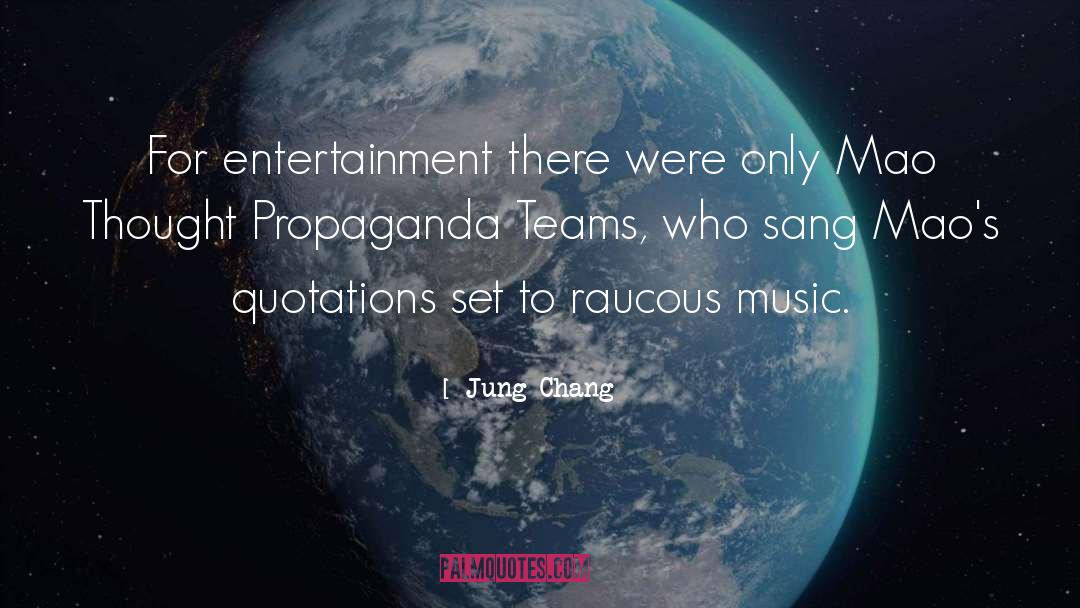
It's taken us 10 years, and it was constant excitement. I was constantly shocked by how evil he could be. Mao was very, very shrewd but he didn't have human feeling.
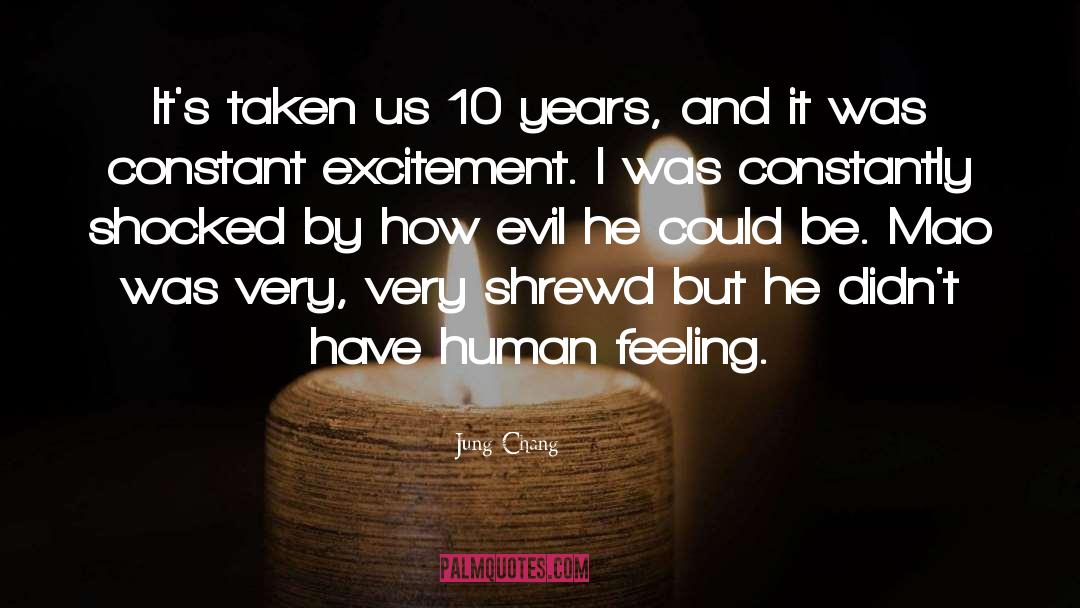
A cautionary tale I had carried with me from China, and which I firmly believed, was that anyone who attempted to have a foreign lover would be drugged and carted back to China in a jute sack.
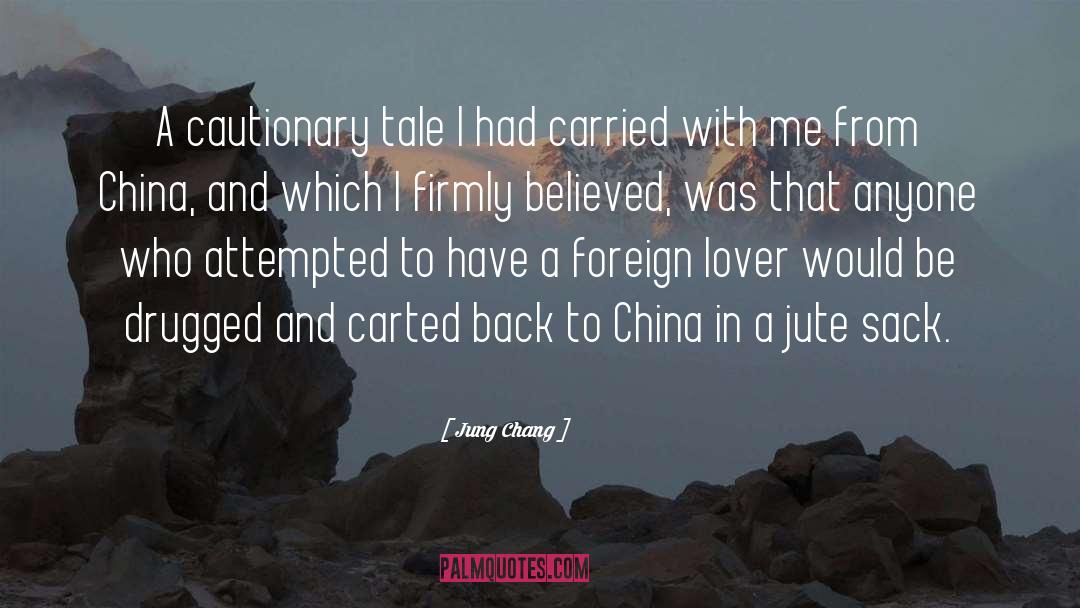
It was not so much a feeling of being insulted, but an overwhelming pain for the people of my native land. We were not treated by our own government as proper human beings, and consequently some outsiders did not regard us as the same kind of humans as themselves. I thought of the old observation that Chinese lives were cheap, and one Englishman's amazement that his Chinese servant should find a toothache unbearable.
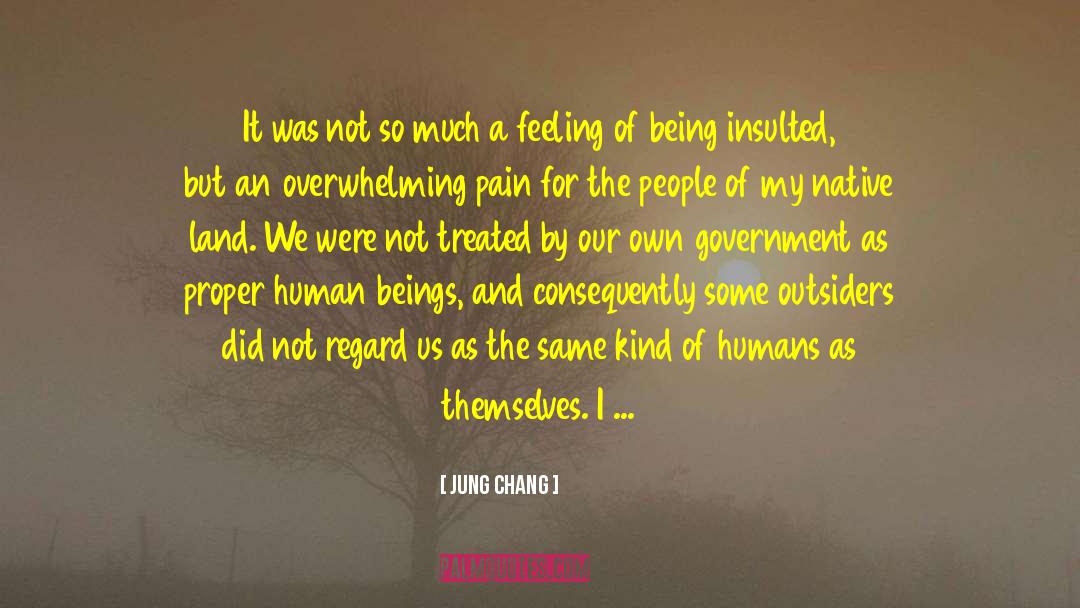
What has marked Chinese society is its level of cruelty, not just revolutions and wars. We ought to reject it totally, otherwise in another upheaval there will be further cruelty.
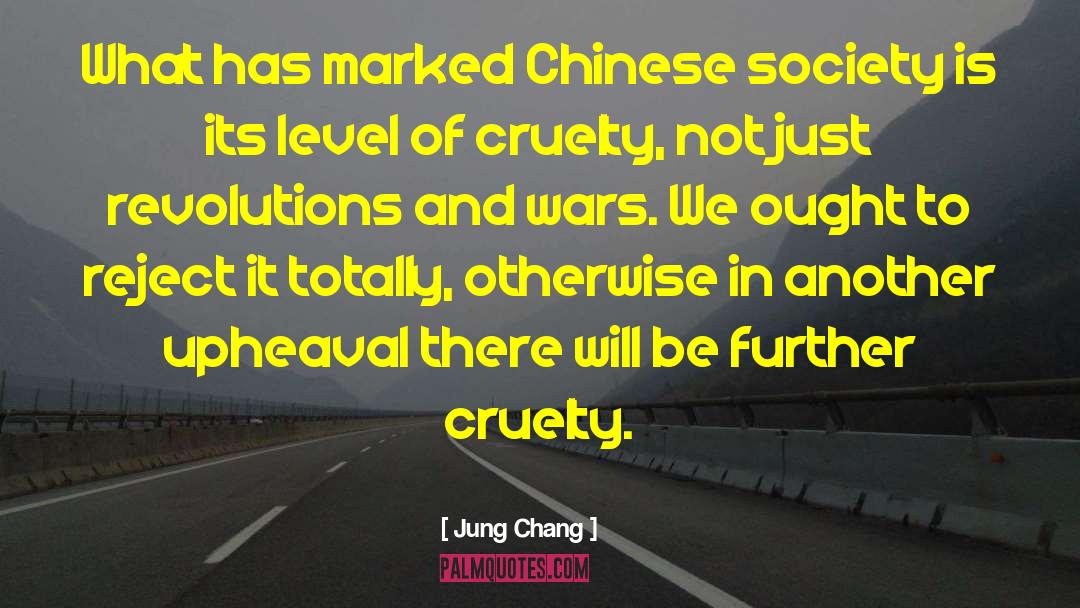
I was extremely curious about the alternatives to the kind of life I had been leading, and my friends and I exchanged rumors and scraps of information we dug from official publications. I was struck less by the West's technological developments and high living standards than by the absence of political witch-hunts, the lack of consuming suspicion, the dignity of the individual, and the incredible amount of liberty. To me, the ultimate proof of freedom in the West was that there seemed to be so many people there attacking the West and praising China. Almost every other day the front page of Reference, the newspaper which carded foreign press items, would feature some eulogy of Mao and the Cultural Revolution. At first I was angered by these, but they soon made me see how tolerant another society could be. I realized that this was the kind of society I wanted to live in: where people were allowed to hold different, even outrageous views. I began to see that it was the very tolerance of oppositions, of protesters, that kept the West progressing.
Still, I could not help being irritated by some observations. Once I read an article by a Westerner who came to China to see some old friends, university professors, who told him cheerfully how they had enjoyed being denounced and sent to the back end of beyond, and how much they had relished being reformed. The author concluded that Mao had indeed made the Chinese into 'new people' who would regard what was misery to a Weste

For anyone to open their heart, they need the right atmosphere, and something to prompt them. For my mother it was her trip abroad: she was in a very relaxed, understanding environment. I was very sympathetic towards her.

In spring 1989 ... I saw the buildup of demonstrations from Chengdu to Tiananmen Square. It struck me that fear had been forgotten to such an extent that few of the millions of demonstrators perceived danger. Most seemed to be taken by surprise when the army opened fire.
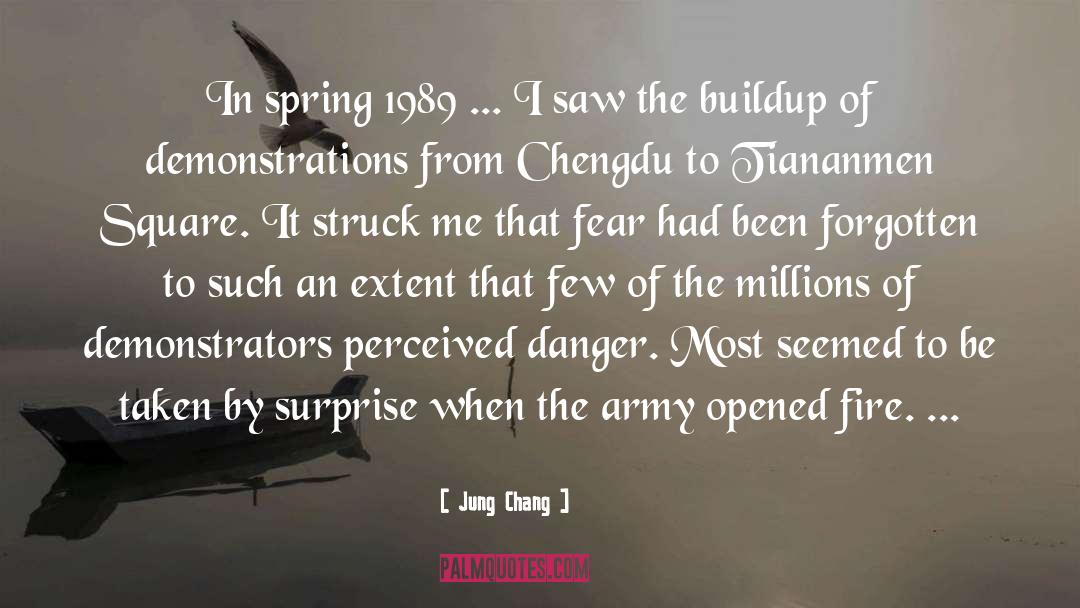
By tradition, a teacher was a most revered figure, a mentor for life, who imparted wisdom as well as knowledge, and who must be respected like a parent. (The murder of a teacher was classified as parricide, which, like treason, was punishable by death of a thousand cuts.) Emperors and princes set up shrines in their homes to honour their deceased tutors.
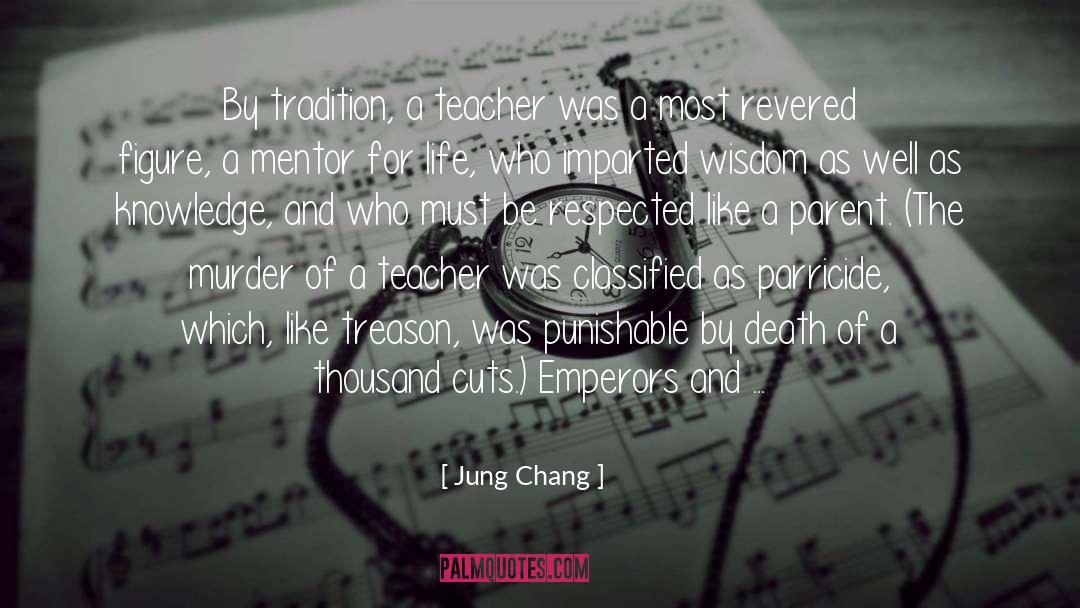
At night I locked my bedroom door, because [my father] could not sleep and would insist on talking to me, endlessly, without making sense. But there was a small window over the door which could not be locked. One night I woke up to see him slithering through the tiny aperture and jumping nimbly to the floor. But he paid no attention to me. He aimlessly picked up various pieces of heavy mahogany furniture and let them drop with seemingly little effort. In his insanity he had become superhumanly agile and powerful. Staying with him was a nightmare.
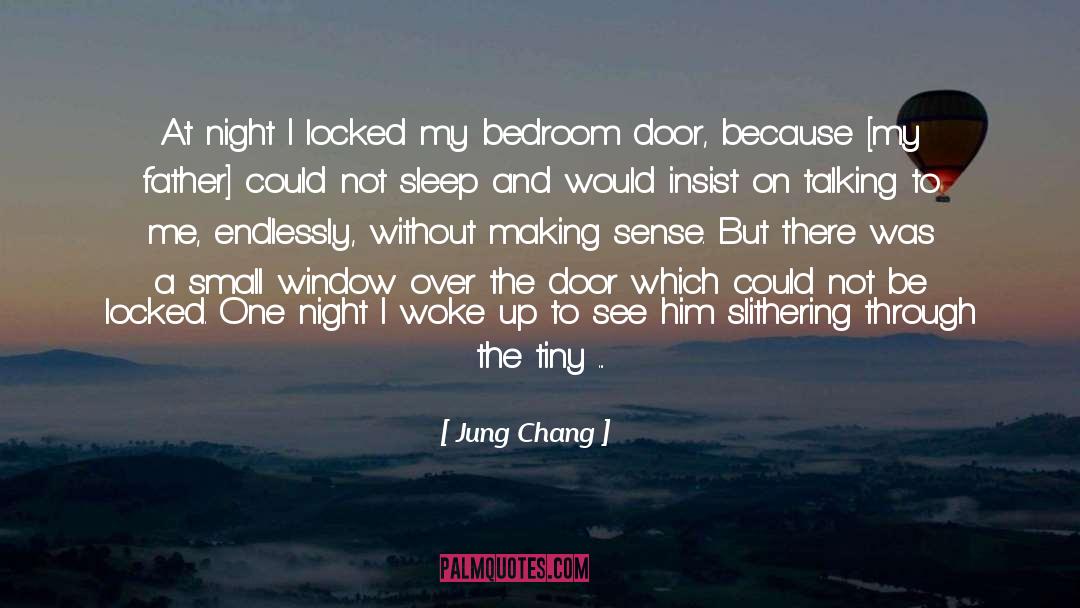
Few of her achievements have been recognised, and when they are, the credit is invariably given to the men serving her. This is largely due to a basic handicap: that she was a woman and could only rule in the name of her sons ... In terms of groundbreaking achievements, political sincerity and personal courage, Empress Dowager Cixi set a standard that has barely been matched.

Much of Chinese society still expected its women to hold themselves in a sedate manner, lower their eyelids in response to men's stares, and restrict their smile to a faint curve of the lips which did not expose their teeth. They were not meant to use hand gestures at all. If they contravened any of these canons of behavior they would be considered 'flirtatious." Under Mao, flirting with./bre/gners was an unspeakable crime.
I was furious at the innuendo against me. It had been my Communist parents who had given me a liberal upbringing.
They had regarded the restrictions on women as precisely the sort of thing a Communist revolution should put an end to. But now oppression of women joined hands with political repression, and served resentment and petty jealousy.
One day, a Pakistani ship arrived. The Pakistani military attache came down from Peking. Long ordered us all to spring-clean the club from top to bottom, and laid on a banquet, for which he asked me to be his interpreter, which made some of the other students extremely envious. A few days later the Pakistanis gave a farewell dinner on their ship, and I was invited. The military attache had been to Sichuan, and they had prepared a special Sichuan dish for me. Long was delighted by the invitation, as was I. But despite a personal appeal from the captain and even a threat from Long to bar future students, my teachers said that no one was allowed on board a foreign ship.
"Who
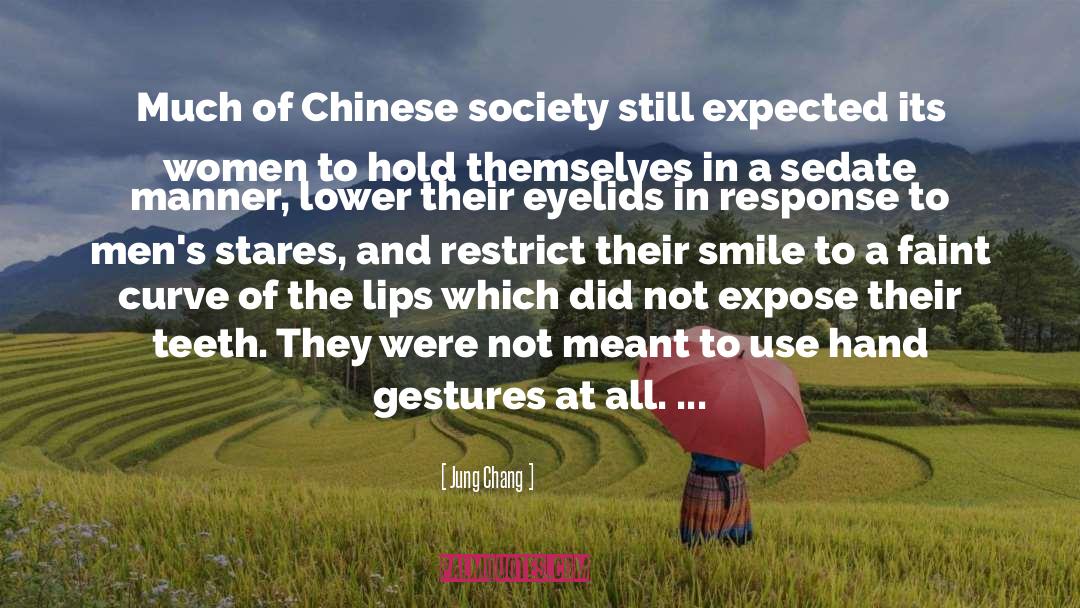
In certain areas where the media are still controlled, the changes have come to a halt, which is a very frustrating situation. I would like the changes to take place throughout China.
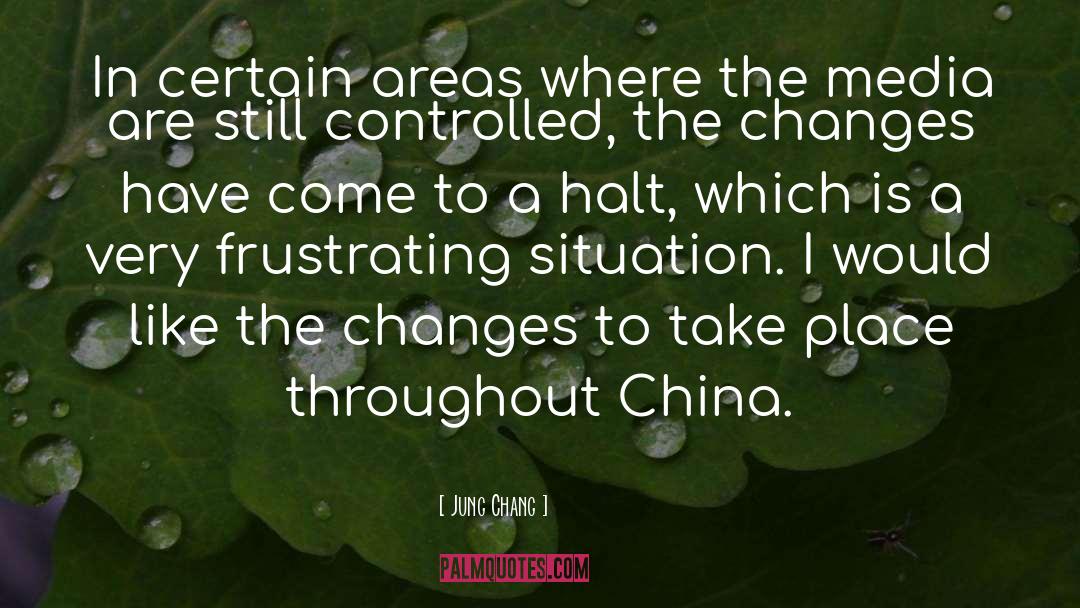
When he asked my grandmother if she would mind being poor, she said she would be happy just to have her daughter and himself: 'If you have love, even plain water is sweet.
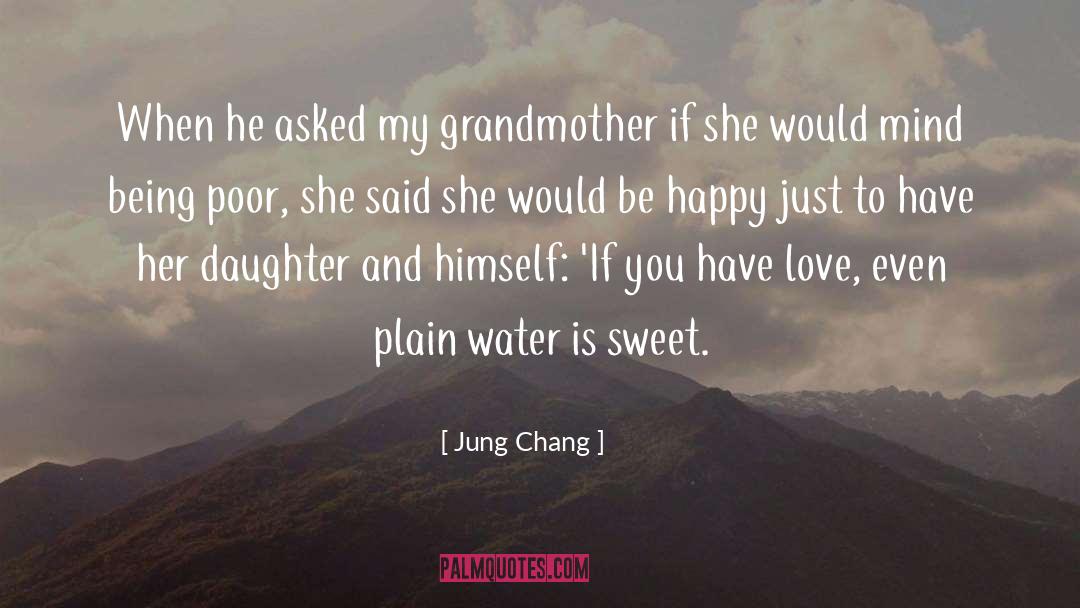
They were endowed with the qualities of youth- they were rebellious, fearless, eager to fight for a 'just cause', thirsty for adventure and action. They were also irresponsible, ignorant, and easy to manipulate- and prone to violence. Only they could give Mao the immense force that he needed to terrorize the society.
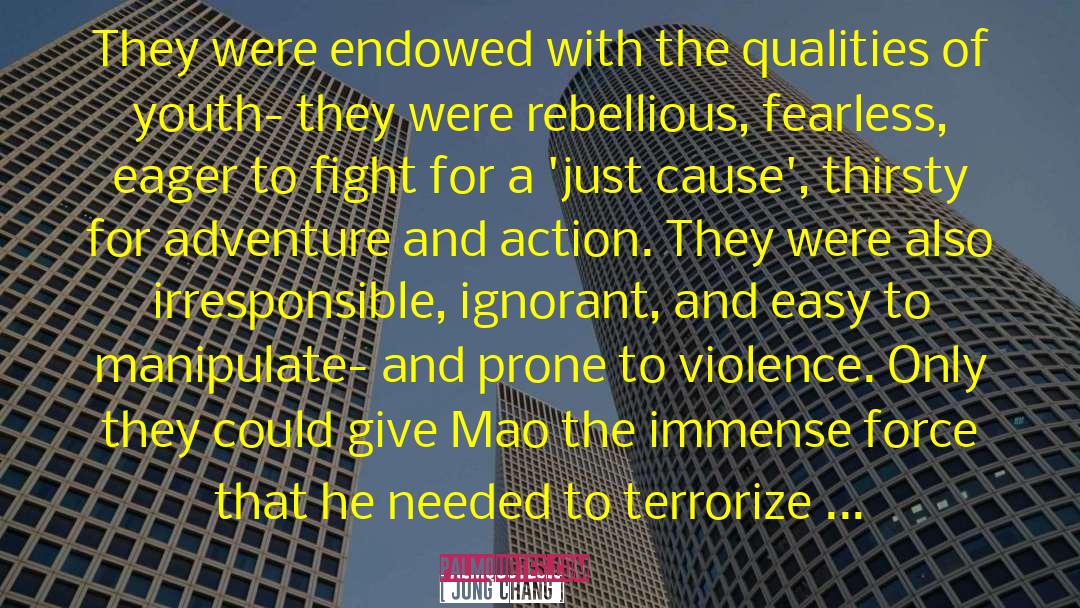
China is more prosperous than before. The people have better lives but they are not happy and confident because the scars are still there.

Father is close, Mother is close, but neither is as close as Chairman Mao.
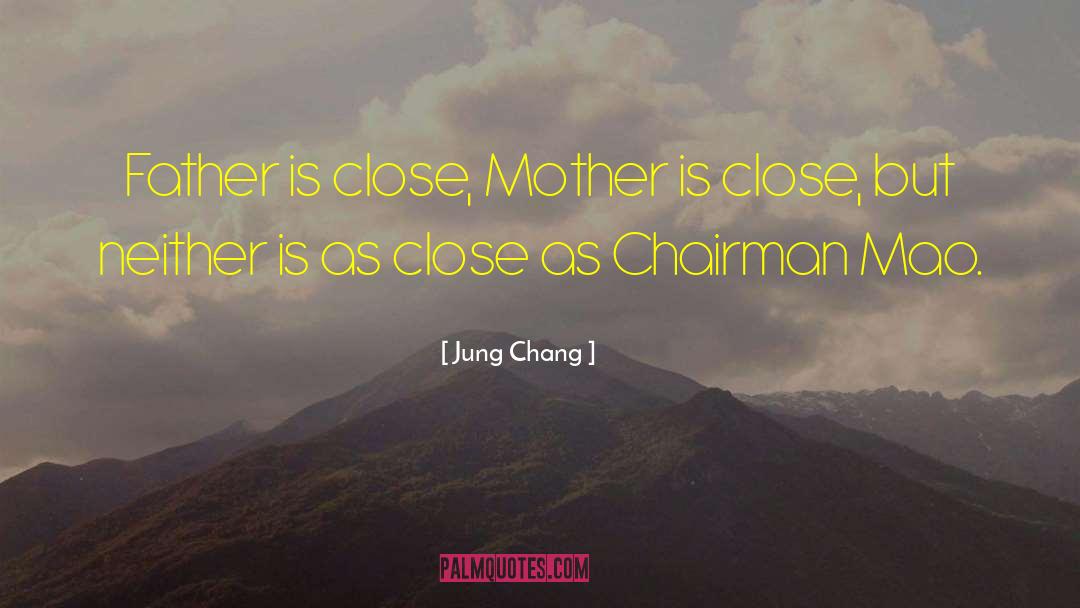
The summer of 1950 was the hottest in living memory, with high humidity and temperatures above 100 F. My mother had been washing every day, and she was attacked for this, too. Peasants, especially in the North where Mrs. Mi came from, washed very rarely, because of the shortage of water. In the guerrillas, men and women used to compete to see who had the most 'revolutionary insects' (lice).
Cleanliness was regarded as un proletarian When the steamy summer turned into cool autumn my father's bodyguard weighed in with a new accusation: my mother was 'behaving like a Kuomintang official's grand lady' because she had used my father's leftover hot water. At the time, in order to save fuel, there was a rule that only officials above a certain rank were entitled to wash with hot water.
My father fell into this group, but my mother did not. She had been strongly advised by the women in my father's family not to touch cold water when she came near to delivery time. After the bodyguard's criticism, my father would not let my mother use his water. My mother felt like screaming at him for not taking her side against the endless intrusions into the most irrelevant recesses of her life.
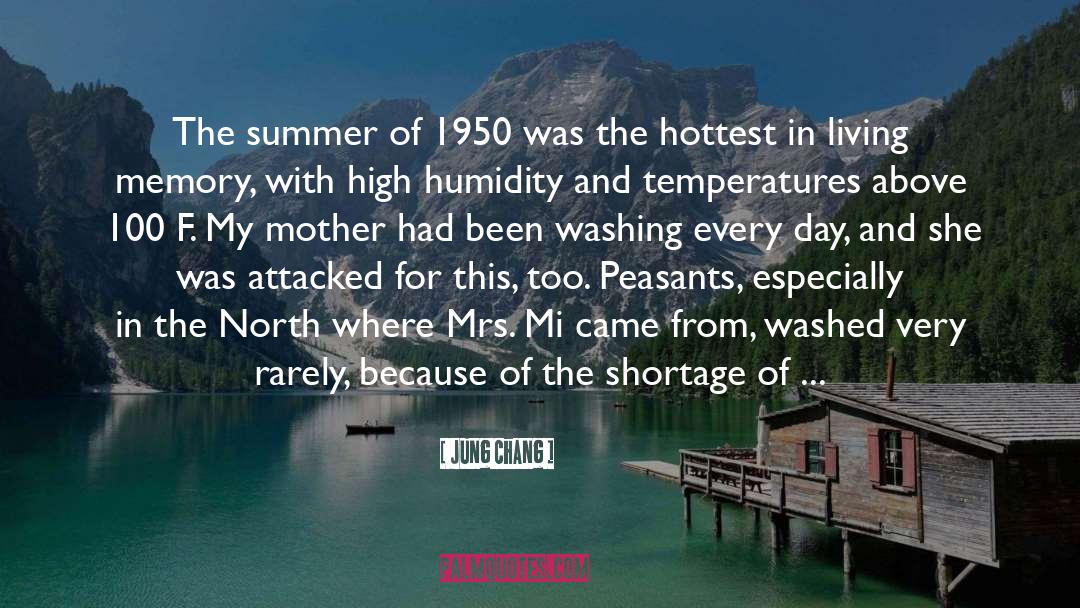
Instead of sniping at her like Mrs. Mi, Mrs. Ting let my mother do all sorts of things she wanted, like reading novels: before, reading a book without a Marxist cover would bring down a rain of criticism about being a bourgeois intellectual.
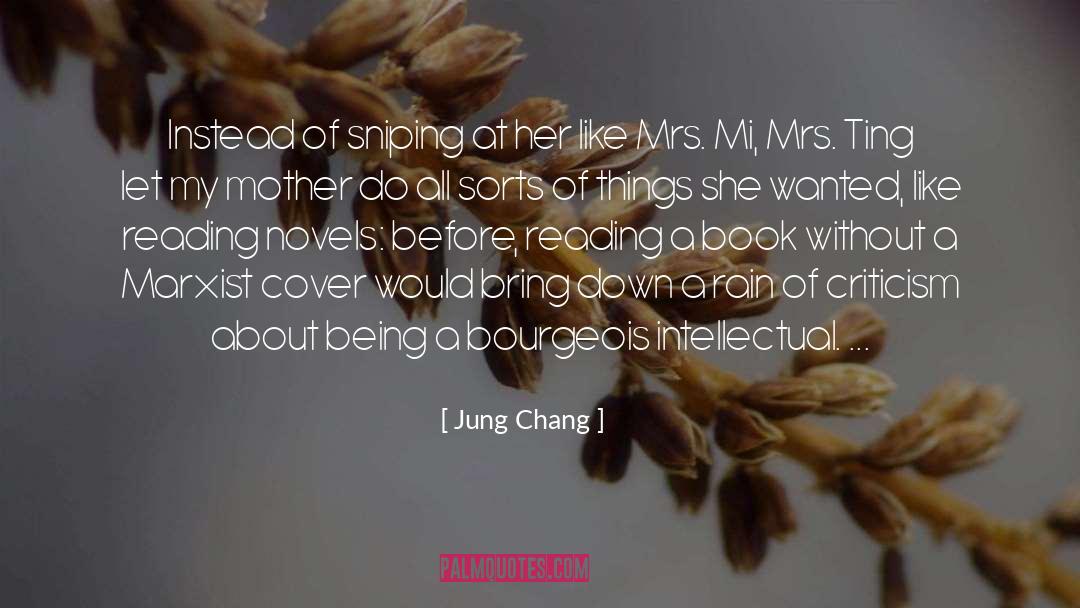
The two women did more than resolve a major problem, they went on to form a political alliance and launch a coup. Cixi was twenty-five years old and Empress Zhen a year younger. Facing them were eight powerful men in control of the state machine. The women were well aware of the risk they were taking. A coup was treason, and if it failed the punishment would be the most painful ling-chi, death by a thousand cuts. But they were willing to take the risk. Not only were they determined to save their son and the dynasty, but they also rejected the prescribed life of imperial widows – essentially living out their future years as virtual prisoners in the harem. Choosing to change their own destiny as well as that of the empire, the two women plotted, often with their heads together leaning over a large glazed earthenware water tank, pretending to be appraising their reflections or just talking girls' talk.
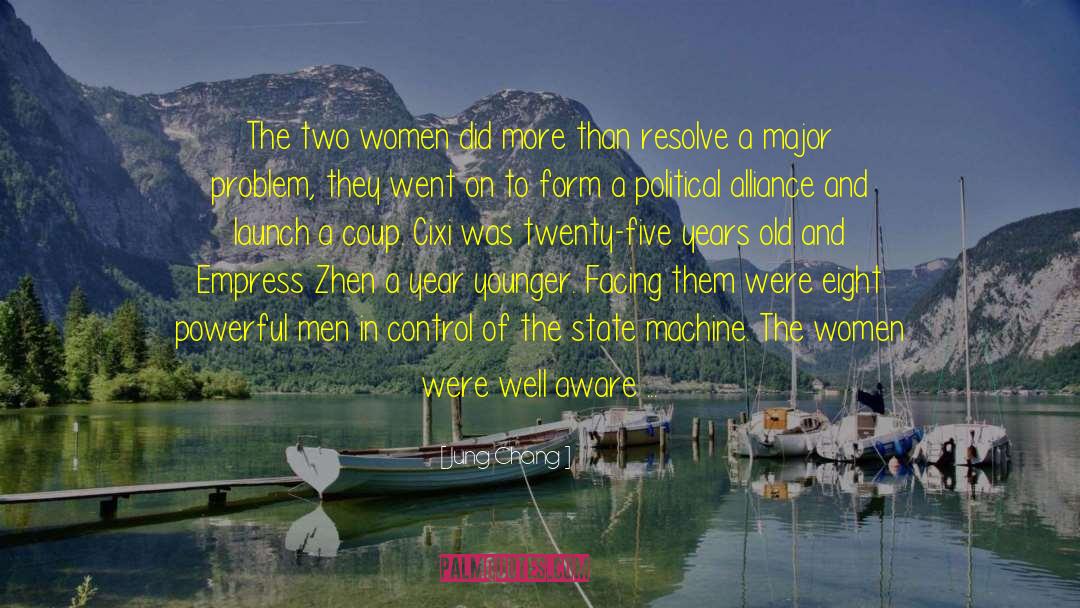
My grandmother's feet had been bound when she was two years old. Her mother ... first wound a piece of white cloth about twenty feet long round her feet, bending all the toes except the big toe inward and under the sole. Then she placed a large stone on top to crush the arch.
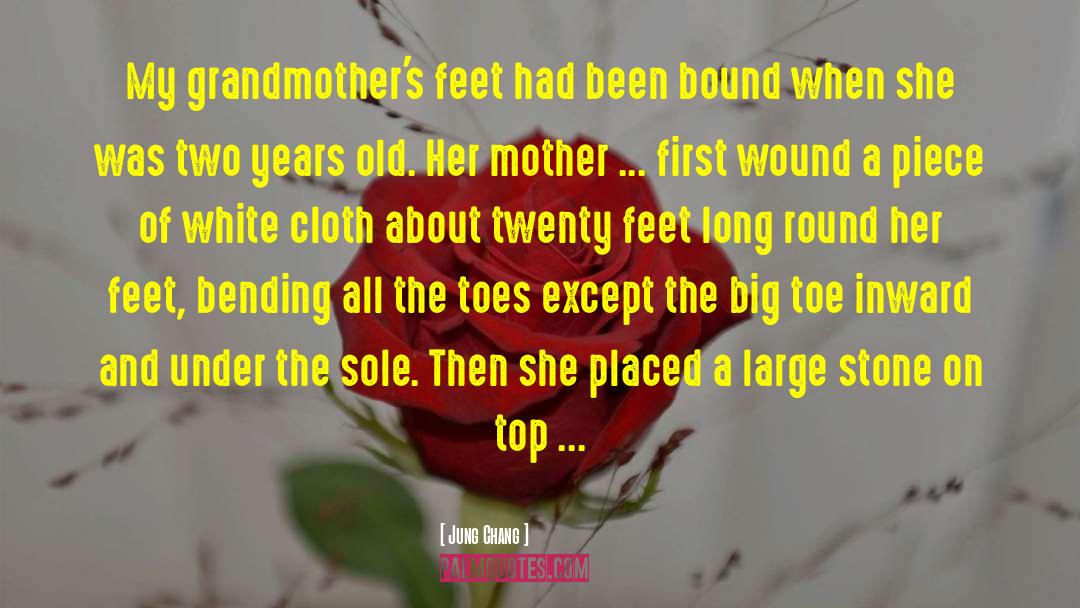
...go in the direction your head is pointed in.
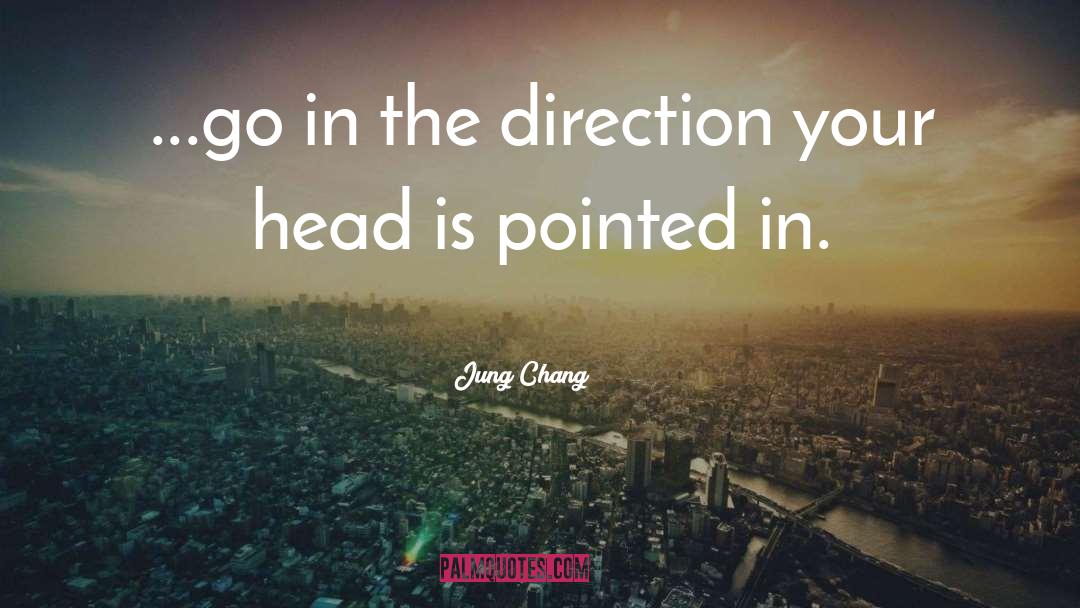
As a child, my idea of the West was that it was a miasma of poverty and misery, like that of the homeless 'Little Match Girl'in the Hans Christian Andersen story. When I was in the boarding nursery and did not want to finish my food, the teacher would say:'Think of all the starving children in the capitalist world!
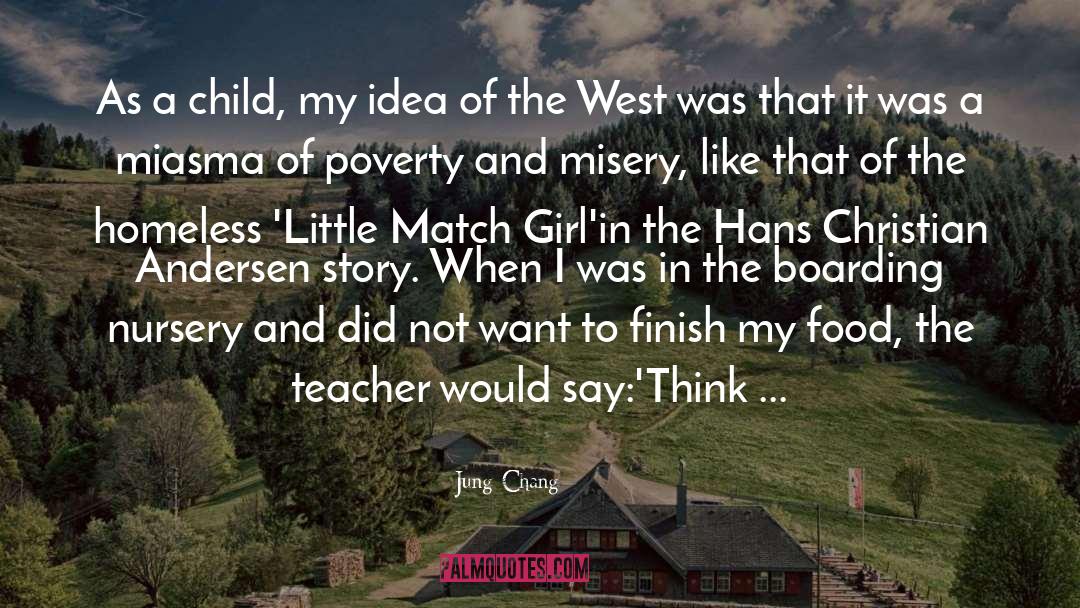
Speaking to a foreigner was the dream of every student, and my opportunity came at last. When I got back from my trip down the Yangtze, I learned that my year was being sent in October to a port in the south called Zhanjiang to practice our English with foreign sailors. I was thrilled.
Zhanjiang was about 75 miles from Chengdu, a journey of two days and two nights by rail. It was the southernmost large port in China, and quite near the Vietnamese border.
It felt like a foreign country, with turn-of-the-century colonial-style buildings, pastiche Romanesque arches, rose windows, and large verandas with colorful parasols. The local people spoke Cantonese, which was almost a foreign language. The air smelled of the unfamiliar sea, exotic tropical vegetation, and an altogether bigger world.
But my excitement at being there was constantly doused by frustration. We were accompanied by a political supervisor and three lecturers, who decided that, although we were staying only a mile from the sea, we were not to be allowed anywhere near it. The harbor itself was closed to outsiders, for fear of 'sabotage' or defection. We were told that a student from Guangzhou had managed to stow away once in a cargo steamer, not realizing that the hold would be sealed for weeks, by which time he had perished. We had to restrict our movements to a clearly defined area of a few blocks around our residence.
Regulations like these were part of our daily li

If you have love, even plain cold water is sweet.
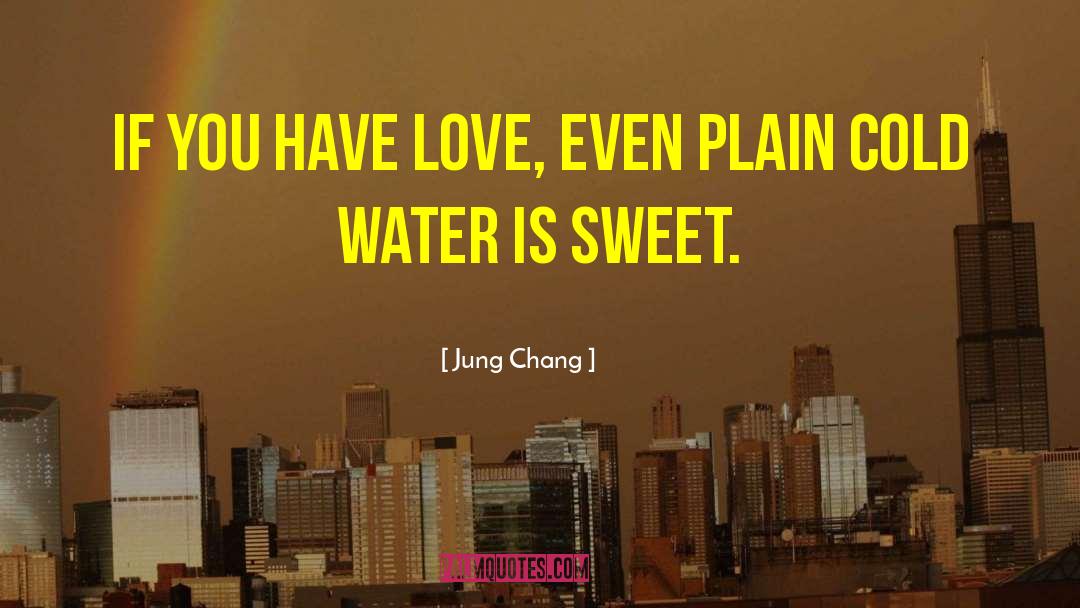
Fallowing the custom, my great-grandfather was married young, at fourteen, to a woman six years his senior. It was considered one of the duties of a wife to help bring up her husband.

Dr. Xia was working as a salaried doctor attached to another man's medicine shop, which did not give him much chance to display his skill. But he worked had, and gradually his reputation began to grow. Soon he was invited to go on his first visit to a patient's home. When he came back that evening he was carrying a package wrapped in a cloth. He winked at my mother and his wife and asked them to guess what was inside the package. My mother's eyes was glued to the steaming bundle, and even before she could shout out "Steamed rolls!" she was already tearing the package open. As she was devouring the rolls, she looked up and met Dr. Xia's twinkling eyes. More than fifty years later she can still remember his look of happiness, and even today she says she can remember any food as delicious as those simple wheat rolls.
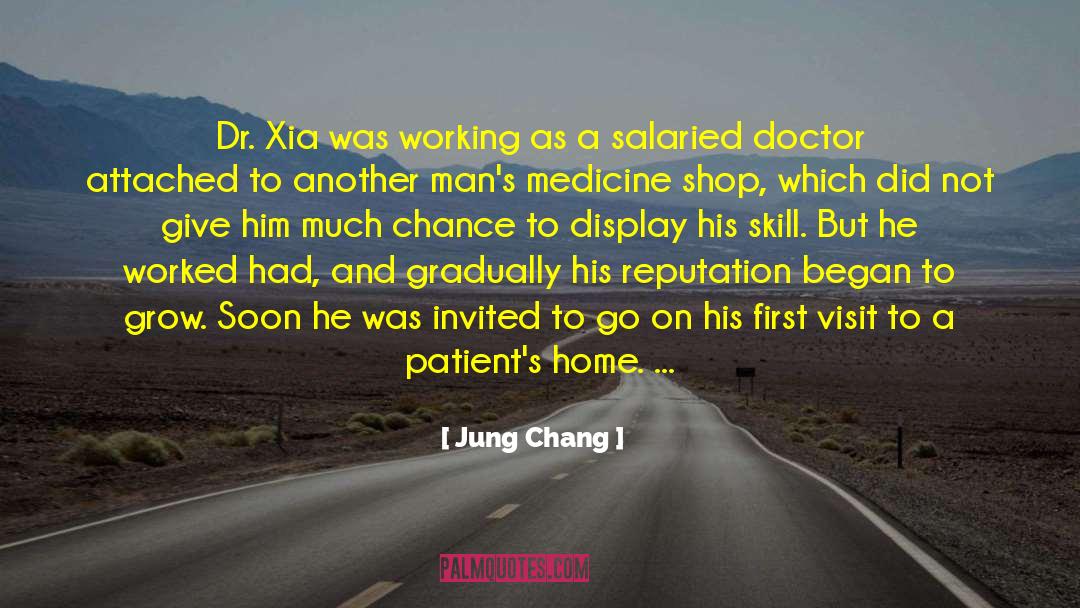
Making a lot of noise was considered essential for a good wedding, as keeping quiet would have been seen as suggesting that there was something shameful about the event.
